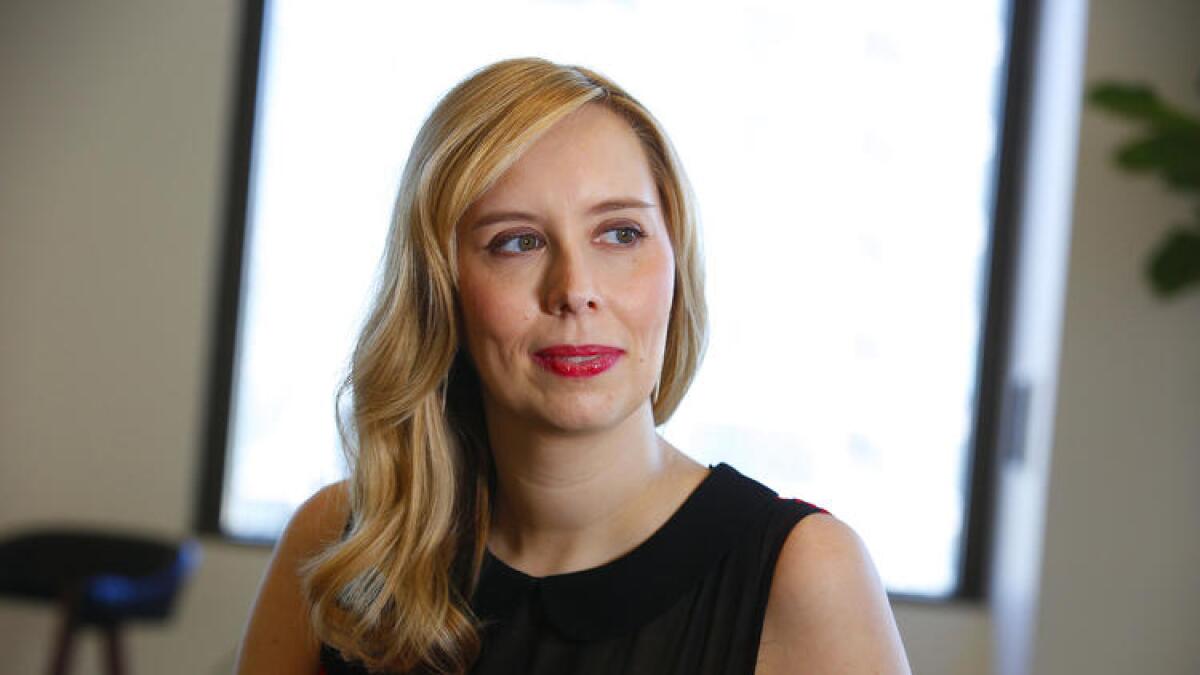“La La Land” did what 800-lb gorillas are supposed to do: dominate the Oscar nominations tally, pulling down 14, including actor, actress, director and picture. That ties the record shared only with “All About Eve” and “Titanic.”
“Arrival” and “Moonlight” each came away with eight nominations. Ava DuVernay’s “13th” joins “O.J.: Made in America” among best documentary feature nominees, continuing our ongoing conversation about race in the United States. Speaking of which, with Viola Davis, Dev Patel, Octavia Spencer, Denzel Washington, Mahershala Ali, Naomie Harris and Ruth Negga getting acting nominations, the 89th Academy Awards will definitely not be so white.
The 89th Academy Awards will take place on Feb. 26 at the Dolby Theatre in Los Angeles and will air live at 5:30 p.m. PT.
- The complete list of Oscar nominations
- Meryl Streep’s response to her 20th Oscar nomination: This GIF
- Are the Oscars still #SoWhite? A look at the diversity among this year’s nominees
- How an underdog screenwriter got the ‘Hidden Figures’ job -- and an Oscar nomination
- PHOTOS: L.A. Times portraits of the nominees for the 2017 Academy Awards
- The Academy Awards through the years
- VIDEO: The Oscars aren’t #SoWhite this time around
- Share via
Syrian subjects of the Oscar-nominated documentary ‘The White Helmets’ unable to attend ceremony due to travel ban
The ramifications of the executive order signed Friday by President Trump to suspend refugee arrivals and ban entry to the United States from seven Muslim-majority countries continue to unfold in Hollywood.
The travel ban means that the subjects of the Oscar-nominated short documentary “The White Helmets,” a film that focuses on the rescue efforts of Syrian Civil Defense volunteers, who have saved more than 60,000 civilian lives in Syria and were nominated for the Nobel Peace Prize, will be unable to attend the ceremony.
“We have always said that if we were to be nominated, we would bring Raed Saleh, the head of the White Helmets, who has spoken many times in D.C., and Khaled Khateeb, the young cinematographer who risked his life over and over again, as our guests,” Joanna Natasegara, producer of “The White Helmets” told The Times. “They’ve been nominated for a Nobel Peace Prize — these people are the bravest humanitarians on the planet, and the idea that they could not be able to come with us and enjoy that success is just abhorrent.”
The news comes on the heels of a statement from Oscar-nominated Iranian director Asghar Farhadi stating that he will not be attending the ceremony, even if granted a travel exception, as “condemnation of the unjust conditions forced upon some of my compatriots and the citizens of the other six countries trying to legally enter the United States of America.”
Farhadi won the Academy Award for foreign language film in 2012 for “A Separation” and is nominated this year for “The Salesman.”
Marcel Mettelsiefen, who is nominated for an Oscar for documentary short subject for “Watani: My Homeland,” about a family fleeing the Syrian civil war and attempting to build a new life in Germany, shared similar sentiments regarding the executive order.
“This travel ban from President Trump is another devastating blow to refugees who have already suffered so much,” Mettelsiefen told The Times.
“We must reconnect with the common humanity of the refugee experience, and we must all remember that the founding story of America is dependent upon people who have fled war, hunger and poverty in search of a better life,” said Mettelsiefen.
- Share via
Oscar-nominated Iranian director Asghar Farhadi will not attend the ceremony

Protesting President Trump’s executive order banning Syrian refugees and citizens from seven predominantly Muslim countries from entering the United States, Asghar Farhadi, the director of the Oscar-winning film from Iran, “A Separation,” and this year’s Oscar-nominated film “The Salesman,” has decided that he will not be attending the Oscars -- even if he were granted an exception to do so.
In a statement to the New York Times, Farhadi laid out why:
I regret to announce via this statement that I have decided to not attend the Academy Awards Ceremony alongside my fellow members of the cinematic community.
Over the course of the past few days and despite the unjust circumstances which have risen for the immigrants and travelers of several countries to the United States, my decision had remained the same: to attend this ceremony and to express my opinions about these circumstances in the press surrounding the event. I neither had the intention to not attend nor did I want to boycott the event as a show of objection, for I know that many in the American film industry and the Academy of Motion Picture Arts and Sciences are opposed to the fanaticism and extremism which are today taking place more than ever. Just as I had stated to my distributor in the United States on the day the nominees were announced, that I would be attending this ceremony along with my cinematographer, I continued to believe that I would be present at this great cultural event.
However, it now seems that the possibility of this presence is being accompanied by ifs and buts which are in no way acceptable to me even if exceptions were to be made for my trip. I would therefore like to convey via this statement what I would have expressed to the press were I to travel to the United States. Hard-liners, despite their nationalities, political arguments and wars, regard and understand the world in very much the same way. In order to understand the world, they have no choice but to regard it via an “us and them” mentality, which they use to create a fearful image of “them” and inflict fear in the people of their own countries.
This is not just limited to the United States; in my country hardliners are the same. For years on both sides of the ocean, groups of hardliners have tried to present to their people unrealistic and fearful images of various nations and cultures in order to turn their differences into disagreements, their disagreements into enmities and their enmities into fears. Instilling fear in the people is an important tool used to justify extremist and fanatic behavior by narrow-minded individuals.
However, I believe that the similarities among the human beings on this earth and its various lands, and among its cultures and its faiths, far outweigh their differences. I believe that the root cause of many of the hostilities among nations in the world today must be searched for in their reciprocal humiliation carried out in its past and no doubt the current humiliation of other nations are the seeds of tomorrow’s hostilities. To humiliate one nation with the pretext of guarding the security of another is not a new phenomenon in history and has always laid the groundwork for the creation of future divide and enmity. I hereby express my condemnation of the unjust conditions forced upon some of my compatriots and the citizens of the other six countries trying to legally enter the United States of America and hope that the current situation will not give rise to further divide between nations.
Asghar Farhadi, Iran
- Share via
Really, Justin? We’re tempted to give Mr. Timberlake today’s award for most canned reaction to an Oscar nomination
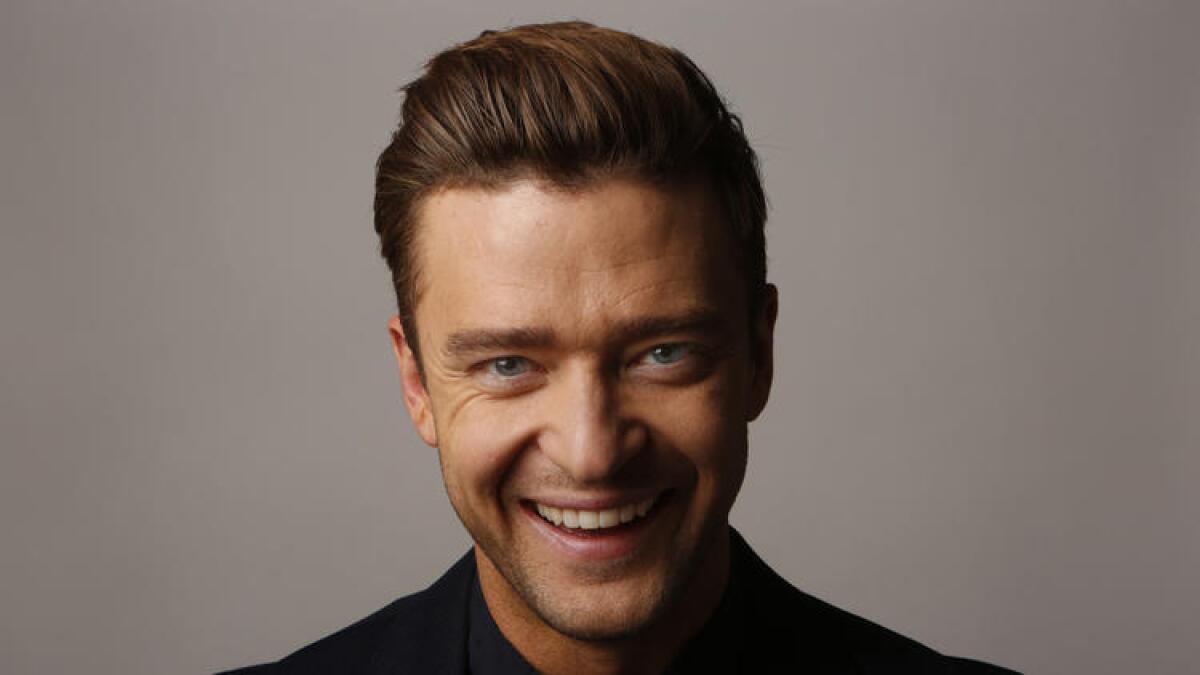
We understand that not every Oscar nominee wants to get on the phone with real, live reporters to give a real, live reaction to news about, oh, one of the most exciting honors a creative person can receive. But the growing trend of publicists dispensing pre-written statements after awards-show news does a disservice to the many entertainers perfectly capable of speaking to the press with charm and wit.
Consider the seemingly canned statement we received from Justin Timberlake’s camp after his original song Oscar nomination for “Can’t Stop the Feeling” from “Trolls”:
“I am speechless, and humbled. Working on this film, and writing ‘CANT STOP THE FEELING!’ with Max Martin and Johan Schuster was such an amazing creative process. Thank you so much to the Academy for this nomination. What an honor to be among these talented nominees.”
The statement is especially disappointing because in a recent interview with Times music critic Mikael Wood, the multi-talented Timberlake was playful and spontaneous.
“I was like, ‘You fools! I don’t know why you’re entrusting me with this,” he told Wood about getting the “Trolls” offer, and described how Lionel Richie and Earth, Wind & Fire music influenced his decision to take the job.
And so, as we come to the end of this Oscar nominations day, we have a simple request: If you’re not going to take our calls, at least delight us the way awards queen Meryl Streep did today with this GIF:
- Share via
Ruth Negga points to the Lovings’ quiet yet tireless fight to change American history in the wake of her Oscar nom

I am truly humbled by the news this morning, and I thank the Academy for this recognition, which I share with my co-collaborators Jeff Nichols and Joel Edgerton. It has been such an honor to have been given the opportunity to tell the incredible story of Richard and Mildred Loving, who serve as an inspiration that ordinary people can do extraordinary things. The Lovings fought quietly yet tirelessly, and changed the course of American legal history. Today, to be among such extraordinary women -- my fellow nominees, my peers with films this year, and the legendary performers whose work of years past has long inspired me ... this means a great deal to me.
— Ruth Negga, Academy Award nominee for lead actress
- Share via
From Mel Gibson to Meryl Streep, this year’s Oscar nominations were influenced by the Golden Globes
Decided on by about 7,500 fewer voters than the Oscars -- and with many fewer degrees of credibility -- the Golden Globes are often derided as an awards-show punchline.
Who are these 80 entertainment reporters to determine what Hollywood thinks are the best movies of the year, when so many thousands of industry veterans vote on awards just weeks later?
But the first group may have had an unusually large effect on the latter this year.
When the Academy of Motion Pictures Arts and Sciences announced its nominations Tuesday morning, it had put “Elle” star Isabelle Huppert on the shortlist for lead actress, while leaving out favorites Amy Adams (“Arrival”) and Annette Bening (“20th Century Women”).
Huppert’s profile was raised dramatically in the critical final days of voting when the Globes gave her an upset victory of sorts in lead actress in a drama award -- then she gave a bubbly speech that played well to the thousands of voters watching. Though it’s impossible to know how many votes shifted, her elevated stock in the final five days of voting only helped her candidacy.
Also nestling its way into voters’ minds from the Beverly Hilton ballroom was Meryl Streep, who was considered a bubble candidate at best for her role as a bad opera singer in the little-seen “Florence Foster Jenkins.” But she became a hero, especially in many precincts of Hollywood, at the Golden Globes, when she gave a fiery anti-Trump speech that included such as lines as “When the powerful use their position to bully others, we all lose.”
A backlash from Trump and Trump supporters only solidified her status, and Streep’s Oscar chances began to steadily rise, until Tuesday she notched an Oscar spot that might otherwise have gone to Adams or Bening. (Whether the Globes speech and its attention prompts Oscar producers to give her a platform at their show as well remains to be seen.)
But maybe the biggest contribution the Globes made to the Oscars comes with a polarizing personality: Mel Gibson.
Gibson was a somewhat unexpected juggernaut on Tuesday, his “Hacksaw Ridge” earning six nominations, including picture and director (both over Oscar darlings Clint Eastwood and Martin Scorsese).
As it turned out, Gibson was nominated for picture and director by the Hollywood Foreign Press Assn. as well. In fact, the group was one of the first to normalize the filmmaker after the string of racist, misogynist and anti-Semitic comments that put him in “director jail” a decade or so ago. They invited him to introduce the top honor of motion picture-drama last year at a point when few high-profile shows would have Gibson on. (It devolved into awkward barbs between him and Globes host Ricky Gervais.)
Gibson had been shunned by much of Hollywood following the multiple incidents -- so much so that Robert Downey Jr. asked forgiveness for him several years back. The Globes’ embrace of Gibson helped pave the way for him to return to Oscar’s good graces.
The HFPA won’t win over skeptics who say the group does not represent people in mainstream Hollywood. But Tuesday’s Oscar nominations proves at least one thing: Those people are watching.
- Share via
‘Meryl Streep just feels like a check-the-box nomination’: L.A. Times critics on the new Oscar nominations

From Amy Adams’ leading actress snub to Mel Gibson’s resurgence, L.A. Times film critics Kenneth Turan and Justin Chang discuss the Oscar nominations.
Dueling L.A. Times film critics, Justin Chang and Kenneth Turan, take a break from the Sundance Film Festival to chat about the 2017 Oscar nominees.
Who was snubbed? Who was a surprise? And what is Turan over? Apparently Meryl Streep’s nomination.
- Share via
Amazon becomes the first streaming company to score a best picture nomination
Amazon Studios, the film and TV production arm of Jeff Bezos’ e-commerce giant, made history Tuesday by becoming the first video streaming company to score a best picture nomination.
“Manchester By the Sea,” the acclaimed Casey Affleck drama backed by Amazon and distributed theatrically by Roadside Attractions, scored six nods from the Academy of Motion Picture Arts and Sciences, which holds its awards ceremony Feb. 26.
To be sure, “Manchester By the Sea,” up for awards including lead actor, lead actress and director, is not streaming yet on the Amazon Prime service. Unlike Netflix, Amazon’s movie business follows the traditional windowing model where movies run exclusively in theaters before landing on home video outlets.
- Share via
Watch the Oscar-nominated 360-degree short film ‘Pearl,’ set entirely inside a car
In the Oscars’ animated short category, one film, “Pearl,” brings a new technical twist to the party: the Google 360 experience.
“Pearl,” the story of a father and daughter who travel the country in pursuit of their dreams, takes place entirely inside the family car, which the viewer experiences sitting passenger side throughout the whole story.
The immersive, 360-degree animated Google Spotlight Story, which allows a viewer to look up, down and all around to see different parts of the story, was directed by Patrick Osborne.
If you’re watching “Pearl” in two dimensions — perhaps via the video embedded above — be careful how you navigate, or you might wind up staring out the hatchback’s sunroof for most of the 5 minutes and 38 seconds.
For a more seamless experience, download the Google Spotlight Stories app and change your point of view while watching the short by moving your phone around in three-dimensional space. It’s trippy.
Psst: Bonus points from us if you spin around in your office chair while you’re watching it.
- Share via
‘O.J.: Made in America’ looks to double-dip at this year’s Oscars and Emmys
With an Academy Award nomination for documentary feature in hand, does this disqualify Ezra Edelman’s epic, zeitgeist-capturing “O.J.: Made in America” from Emmy contention?
Turns out it doesn’t, and we could very well be hearing Edelman’s name again when the Emmy nominations are announced this summer.
Exploiting a loophole that makes any film that debuts in theaters eligible for Oscar recognition, ESPN Films premiered all 7 1/2 hours of Edeleman’s film in theaters in May before its TV premiere in June.
This isn’t the first time a documentary has been eligible to double-dip. In 2014, Jehane Noujaim’s”The Square” earned four Emmy nominations after being nominated for an Academy Award. Its eligibility for both was contingent upon “The Square” screening in theaters for no more than seven days and in no more than two cities, as stipulated by the TV Academy’s rules. HBO Films’ “Gasland” pulled off a similar feat in 2011, earning nominations at both the Oscars and the Emmys.
One small challenge for “O.J.: Made in America,” however, is that neither of the above films managed to win both awards. Still, after the many accolades it has earned up to this point, along with the dramatization “The People v. O.J. Simpson: American Crime Story,” would you bet against it?
- Share via
Oscar-nominated director Ava DuVernay stresses ‘now more than ever, it is important to educate ourselves’
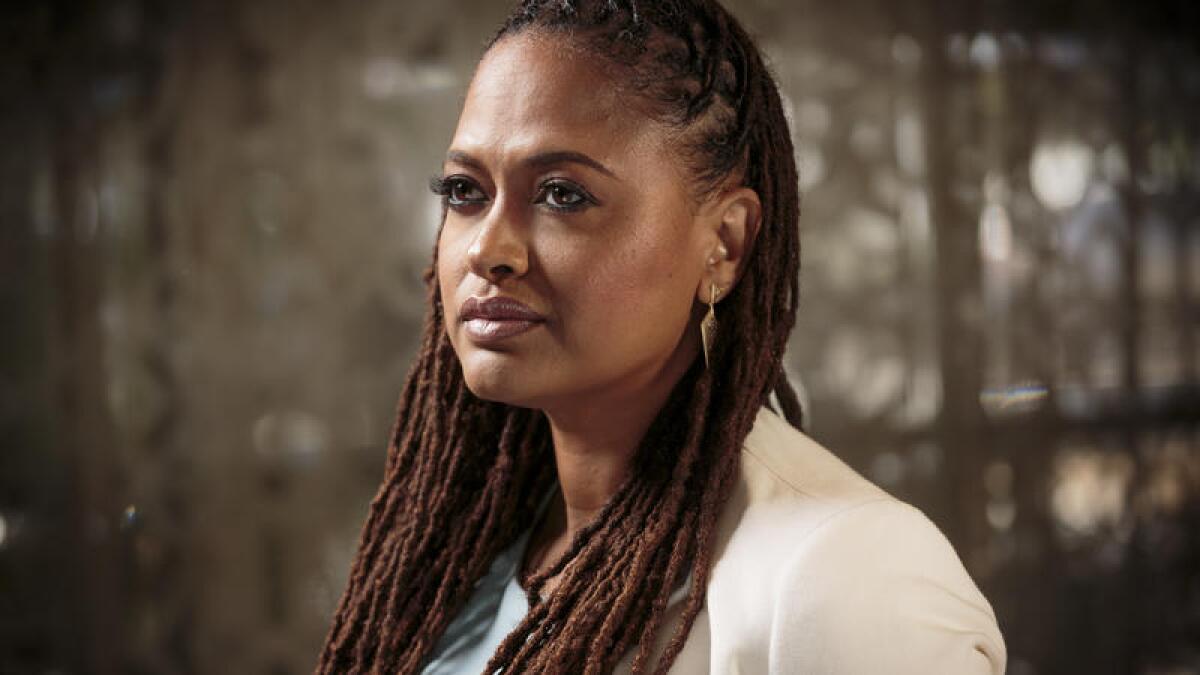
My thanks to the Academy for amplifying the injustices of mass criminalization and mass incarceration that we chronicle in ‘13th.’ Now more than ever, it is important to educate ourselves, explore our shared history and elevate our awareness about matters of human dignity. It’s an honor be included in a category with such fine documentarians and to be nominated in a year that truly embraces and celebrates inclusion within our creative community.
— Ava DuVernay, Oscar nominee for her documentary “13th”
- Share via
Oscar-nominated ‘Zootopia’ directors on how their film mirrors the Black Lives Matter movement

Five years ago, Disney veterans Byron Howard (“Bolt,” “Tangled”) and Rich Moore (“Wreck-It Ralph”) were heartened when their bosses lent support to “Zootopia,” about an enthusiastic female rabbit who dreams of becoming a police officer, defying the odds and prejudices of a socially divided animal kingdom.
“When you say you want to make an animated movie about bias, it doesn’t sound like something that’s going to make a lot of money or be very popular,” said “Zootopia” director Howard with a laugh on the phone from his home in Glendale, near Disney’s headquarters. “But support came from [Disney Chief Executive] Bob Iger and [Disney Chairman] Alan Horn and everyone at the studio, I think, because they saw that the world needed it.”
The urgency of “Zootopia’”s underlying exploration of racial, class, and gender bias within systems of power – led by a chipper bunny rabbit named Judy Hopps, voiced by Ginnifer Goodwin – crystallized even more as the Black Lives Matter movement dominated headlines, sparked by the killings of black American men at the hands of police officers across the country.
“It was horrifying to see that members of our society were being persecuted, very obviously because of what they looked like,” said Moore. “I remember saying, ‘This is exactly what we’re talking about with this movie.’ It was emboldening. We felt like we really needed to do this topic justice, because it wasn’t just a theoretical that we were playing out onscreen.”
What does it mean to you to see a movie like “Zootopia,” built around such a strong and timely social message, be acknowledged by the Oscars the same weekend Donald Trump takes office as president of the United States?
HOWARD: Our crew is just waking up now – we have about 800 people who worked on this film with us for about five years. We all really tried to take what was happening in the world and put it into this movie about a fox and a bunny, which was a pretty remarkable ride. The fact that we [and “Moana”] got nominated was a huge shot in the arm for Disney because 10 years ago, frankly, the studio was struggling hard to make quality films. “Zootopia” is about something that is difficult to talk about; it’s about bias and discrimination. It was reassuring for Rich and myself to take the film around the world and see that wherever we went, people were getting that message.
Does the Oscar nod give you more leeway to integrate these kinds of pointed social commentaries into your next films?
HOWARD: Absolutely. I think the creative community is going to be emboldened. That’s our job, to take what we see around us, what we’re experiencing in life, to make sense of it and to find truth in it – then sift it all out and say, “What does this all mean?” And I think for creative people, if our leaders are heavy-handed and try to clamp down on creativity, that’s just like throwing gasoline on a fire.
We’re charged with making sense of the world around us and making sense of the craziness in everyday life. In a presidency like this one, where truth is totally different from what we’re seeing with our own eyes, I think you’re going to see a lot of pushback.
MOORE: Everybody I knew went [to the women’s march]. I heard from all these people downtown, especially in Los Angeles, three-quarters of a million people, men and women. It’s surreal. Right now there are moments that I experienced in the last few weeks like, am I in a dream? I don’t recognize this type of leadership. What is this? This is what we do when we’re being told that the truth is different than what we see with our own two eyes.
I’m not going to have my kids bullied by leadership. We’re going to push back.
Comedy has a history of using humor to speak truth to power, but in animation that’s much rarer. Do you see more studio execs greenlighting and supporting projects like this? What does it say about studios like Disney and bodies like the academy that films like this can be made and celebrated?
HOWARD: There’s too much at stake not to. And we all understand that these issues are the most important issues for us to talk about right now, to make movies that have a social message that allow people to talk to their families and talk amongst themselves. Social satire, music, comedy, art, has a great ability to point to things in our world that are so hard to deal with otherwise: “What would you, the audience, do if it were you in that situation?” Especially for children, I think it prepares you for life, to let them ponder: “What would I have done if I were Judy?”
MOORE: We spend up to five years on these movies, and they have to mean something. That’s a big part of your life to devote to making a piece of art. It has to be more than just laughs or songs.
- Share via
‘Hacksaw Ridge’s’ Bill Mechanic produced the Academy Awards. Now he’s up for his own Oscar
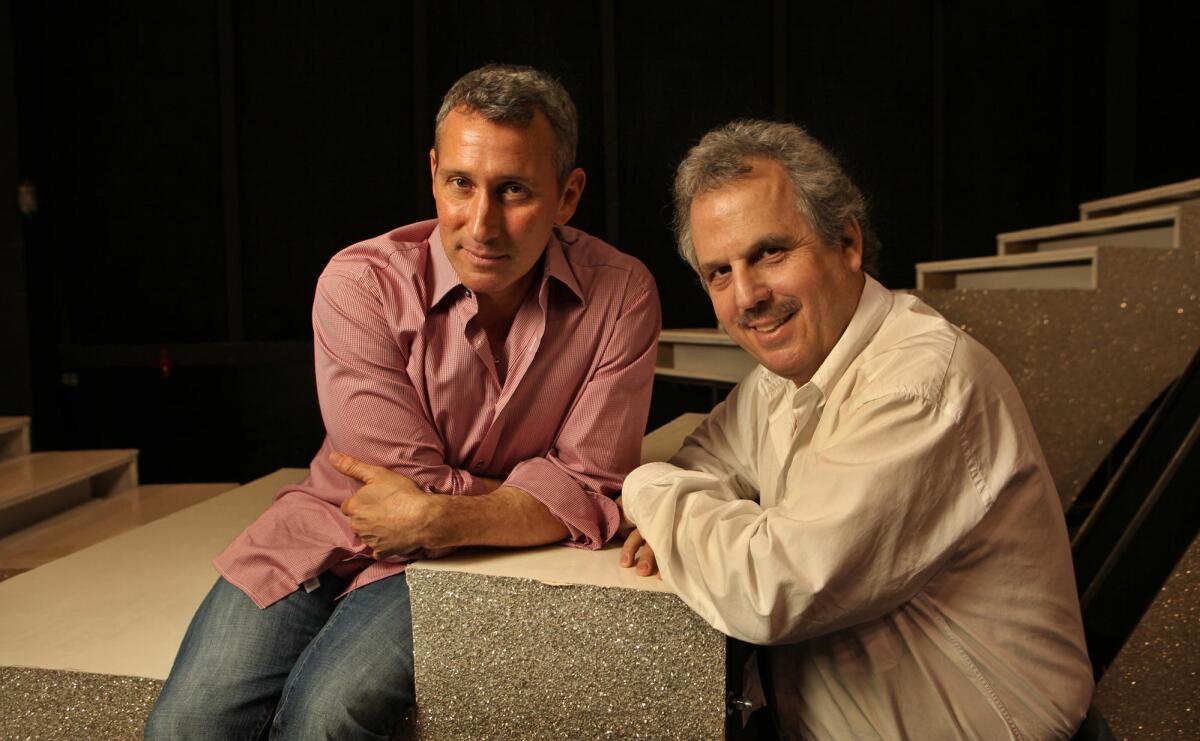
Bill Mechanic has had many Hollywood lives. He’s the former chairman and chief executive of 20th Century Fox Filmed Entertainment, he oversaw the video release of “Fantasia” and other animated classics for Disney, he co-produced “Coraline” (2005) and Terrence Malick’s “The New World” (2005), and in 2010 he co-produced the Academy Awards show.
Certainly during Mechanic’s tenure as head of Fox, the studio was nominated for and won many Oscars -- he was in charge when “Titanic” won 11 Academy Awards, tying with “Ben-Hur” and “The Lord of the Rings” for the record for most wins. Now, however, with the nomination of Mel Gibson’s “Hacksaw Ridge” for a best picture Oscar, he could win an Academy Award of his own as one of the film’s co-producers.
Shortly after the nominations were announced on Tuesday, we reached Mechanic, who described his morning watching the academy’s livestream:
“When Andrew [Garfield] got in -- and I think it would have been a crime if he didn’t -- I thought maybe things would be OK. You don’t know,” he said. “This was definitely a film that had to overcome a lot of stuff to get in. Only by the quality of the movie being so strong did the love overcome the hate.”
Mechanic was especially gratified to see Gibson’s directing nomination.
“It was really great and emotional to see Mel be embraced and the stuff of the past finally being forgiven by Hollywood,” he said. “It’s just such a long, hard journey that it would have been disappointing to see the movie not be recognized.”
Mechanic thinks one of the reasons “Hacksaw Ridge” resonated with audiences and Oscar-nominating voters is that it’s “an old-fashioned movie.”
“We’re a film that’s a moral tale that takes you for a ride,” he said. “Especially when you watch it in the theater, it takes you through a pretty good roller coaster ride and affects you emotionally. I think that’s what makes a great movie, and I think people responded because of it.”
As for the rest of the day after such a momentous morning, Mechanic said, “I should probably stay in, so I can’t do anything wrong. I don’t know what to do.
“Actually, I was braced for whatever happens, good or bad. This is all good. I feel like it was a good ride, a tough ride, and just the nominations are a victory for us.”
- Share via
Watch: The Oscars aren’t #SoWhite this time around

The Oscars aren’t so white any more: This year’s slate of nominees includes a diverse group across multiple categories.
The Oscar ballots this year feature a lot more diverse talent than in the last two years, when the all-white slate of acting nominees inspired #OscarsSoWhite.
- Share via
Jeff Bridges gives the most Jeff Bridges nomination reaction: Deep thoughts after partying until 2 a.m.
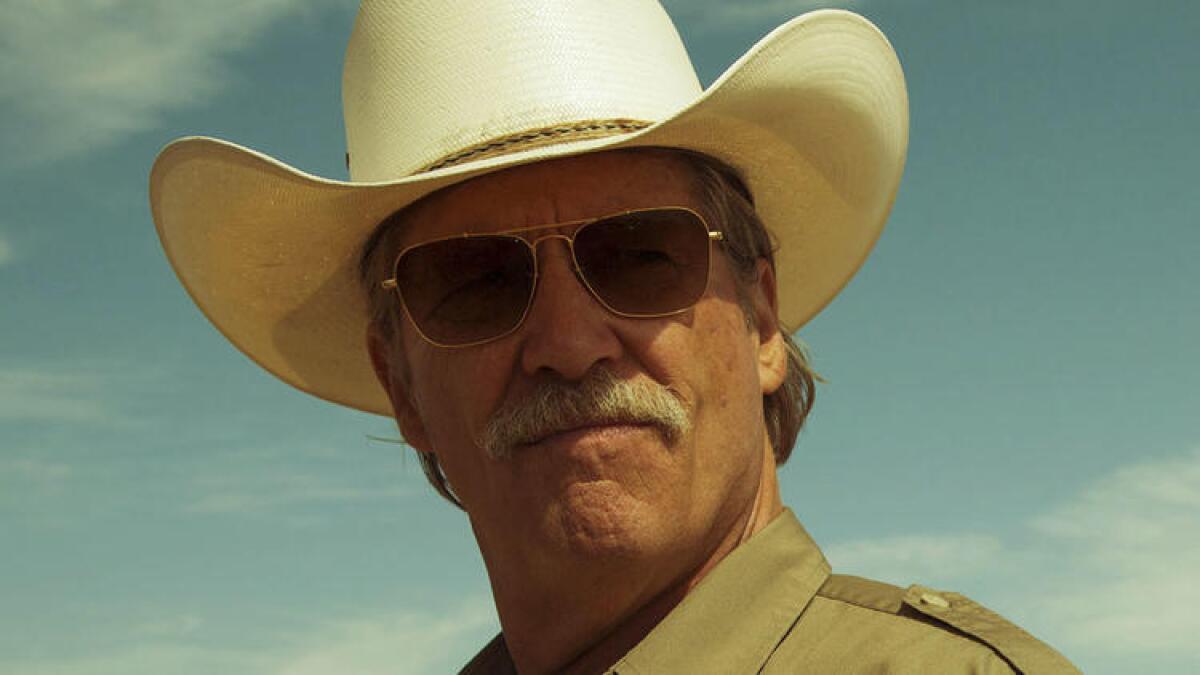
Five hours after Jeff Bridges’ supporting actor Academy Award nomination was announced, he still hadn’t talked to his wife about it.
“I’m flying home. I’m in San Diego now,” he said. “I haven’t given her a call yet.”
See, the “Hell or High Water” actor had a gig Monday night in Solana Beach with his band, Jeff Bridges and the Abiders.
“I partied pretty hard last night, got to bed about 2:30. ... My publicist called and gave me the good news.”
Bridges seemed more excited about the movie getting four nominations total than he was about getting his seventh nod.
“You’ve got our editor, you’ve got best picture — God, that’s a wonderful recognition — and Jake [Roberts], our editor, was acknowledged; that’s wonderful. It’s great, great news. It’s wonderful to be recognized by people who do what you do.”
The movie landed at what he called a “stimulating” time in history. The Women’s March on Washington and the Standing Rock protests came to mind.
“I get a lot of comments ... people saying it’s a movie of our time, and I think it certainly is, but it’s not only for our times,” he said. “It’s kind of reflective of how us human beings have rolled since the beginning of time. We tend to look out for our own self-interest, whether we’re banks ripping people off or poor farmers looking out for their families or oil guys looking out for their interests. ... It has consequences, when you’re only looking out for yourself.”
But when it comes to looking out for himself during Hollywood’s award season, The Dude is looking at it with fresh eyes, as always.
“You never get used to something like this, or I don’t,” said Bridges, who won best actor in 2010 for “Crazy Heart.”
“Red carpets, I’ve been down quite a few. It always seems like the flashbulbs are getting brighter and there’s more craziness. It always seems fresh to me, all of this.”
- Share via
Amazon, ESPN and Google go to the Oscars as Hollywood outsiders prove they can go beyond TV
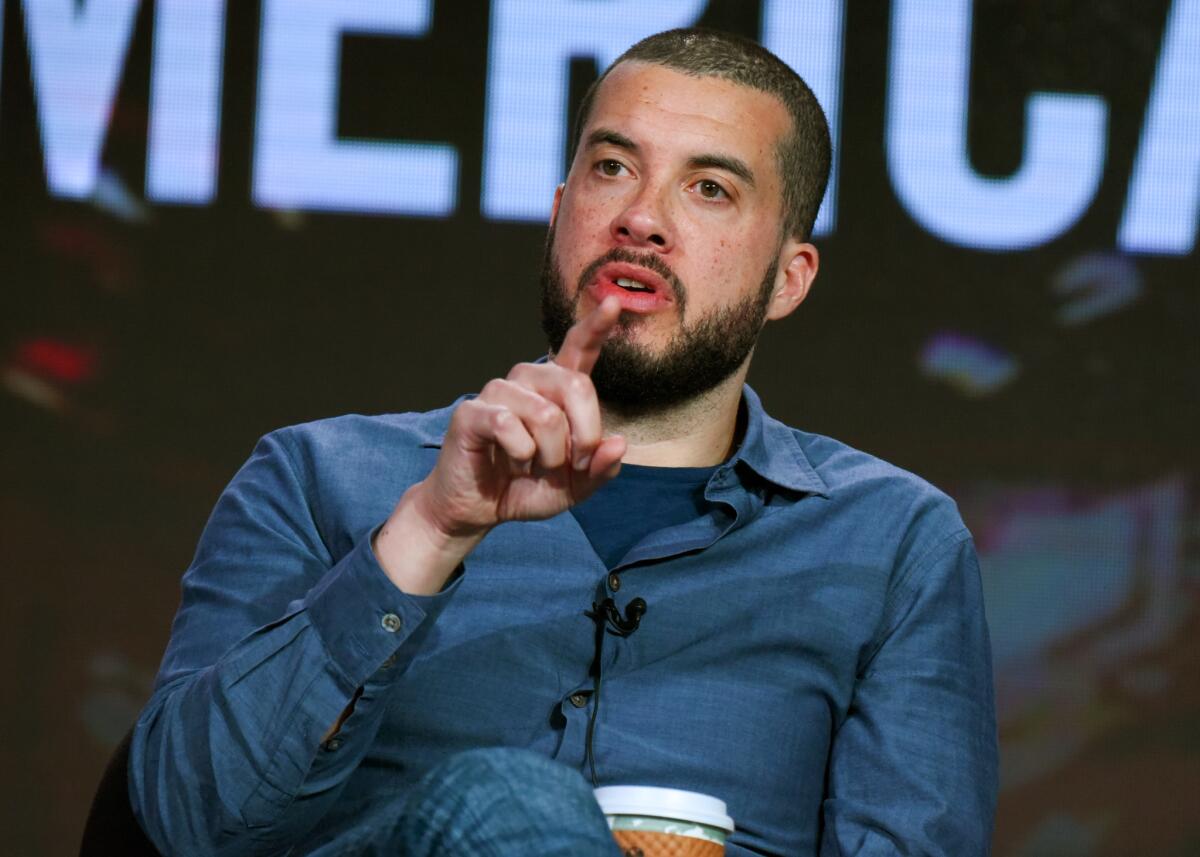
This year’s diversity in Oscar nominations extended beyond actors and filmmakers to media platforms. Amazon, ESPN and Google are not names one normally associates with the Academy Awards but they may find themselves being thanked from the podium this year, and not just for gift cards in presenter swag bags.
Amazon dropped $10 million at Sundance last year for distribution rights to “Manchester by the Sea,” an investment that certainly paid off -- on Tuesday, Amazon became the first streaming service ever to produce a film nominated for best picture.
Netflix, which tried to break through last year with “Beasts of No Nation,” once again had a documentary nomination in Ava DuVernay’s “13th,” but “Manchester’s” six nominations -- best picture, actor (Casey Affleck, who won the Golden Globe), actress (Michelle Williams), supporting actor (Lucas Hedges), director and original screenplay (Kenneth Lonergan) -- mark streaming’s first foray into features.
ESPN also continued to blur genres, scoring its first Oscar nomination ever for the eight-hour, five-part series “OJ: Made in America,” which aired both in theaters and on television (and yes, it is still eligible for next year’s Emmys.).
Google has the short film “Pearl,” which was part of its Spotlight Stories series of 360-degree films. Though it is still available in its original VR-compatible form, it was submitted in 2-D.
Which is too bad -- we were really looking forward to those fancy schmancy Oscar-night virtual reality goggles.
- Share via
Isabelle Huppert on what’s next: ‘Maybe I’ll take a little rest’
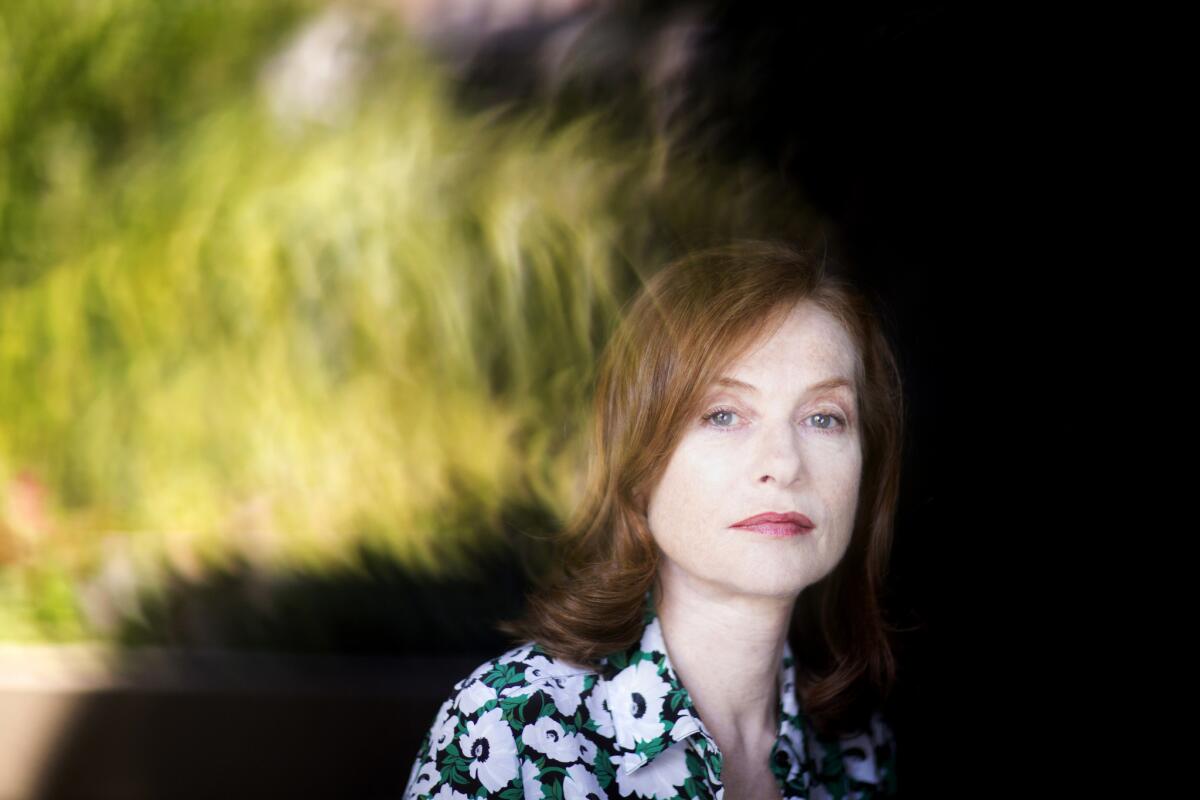
Garnering critical acclaim for her work in both Paul Verhoeven’s “Elle” and Mia Hansen-Løve’s “Things to Come,” 2016 was already a banner year for French actress Isabelle Huppert.
After earning her first Academy Award nomination for her performance in Verhoeven’s film about a woman’s complicated journey post-assault, Huppert spoke to The Times about what gives her nomination for “Elle” special resonance and what lies ahead in her storied career.
Where were you when you learned about your nomination?
I just started a film yesterday with French director Benoît Jacquot, and it was during our lunch break today so I was alone in my room. I got a phone call from Michael Barker from Sony Classics, who told me I was nominated. It was absolutely great. Extraordinary.
You had expressed interest in the film adaptation of “Elle” even before Paul Verhoeven was attached to direct. Does it make the nomination that much more gratifying that it’s for this specific role?
It is, actually.
First of all, it’s a French-speaking film. It’s a Paul Verhoeven film, who I think is an amazing director but is a free spirit. He’s not always liked by everybody. He disturbs people most of the time, but he’s a great, great director.
So to have gotten this nomination for a French-speaking film with a Dutch director, Paul Verhoeven, it’s just amazing. It’s great. Now the film gets all this recognition, which I always thought it should have from the very beginning, and it’s just amazing for me.
You’ve had so many wonderful roles this year. Is it nice to have all of these films on your plate at this stage in your career?
It’s always gratifying because you feel you receive it for the film itself and a little bit maybe for the sum of work. I think I managed to keep a pretty precise line, trying to make films that are as different as possible. I feel like it’s the mission of this journey, and it’s great for me.
That includes all the great American films I did (“Amateur,” “Heaven’s Gate”). I did few American films, but I managed them with the same criteria as I would have in my own country, which is based on the director, who is the main component of the ensemble, always.
You mentioned you’re currently filming “Eva” with Benoît Jacquot. Do you have a lot of films lined up for the future?
I guess I do have many others but I don’t know. I might take a little rest because I’ve been working a lot. I did “Elle” and then I did “Things To Come” just after, and I’ve done so many, many other films, so maybe I’ll take a little rest. Well-deserved, I would say.
Do you have big plans to celebrate your nomination?
I will! I will celebrate with friends, not only today, but all the next days to come. It’s a great day for me.
- Share via
For Andrew Garfield, his ‘Hacksaw Ridge’ Oscar nomination leaves him ‘deeply reassured’
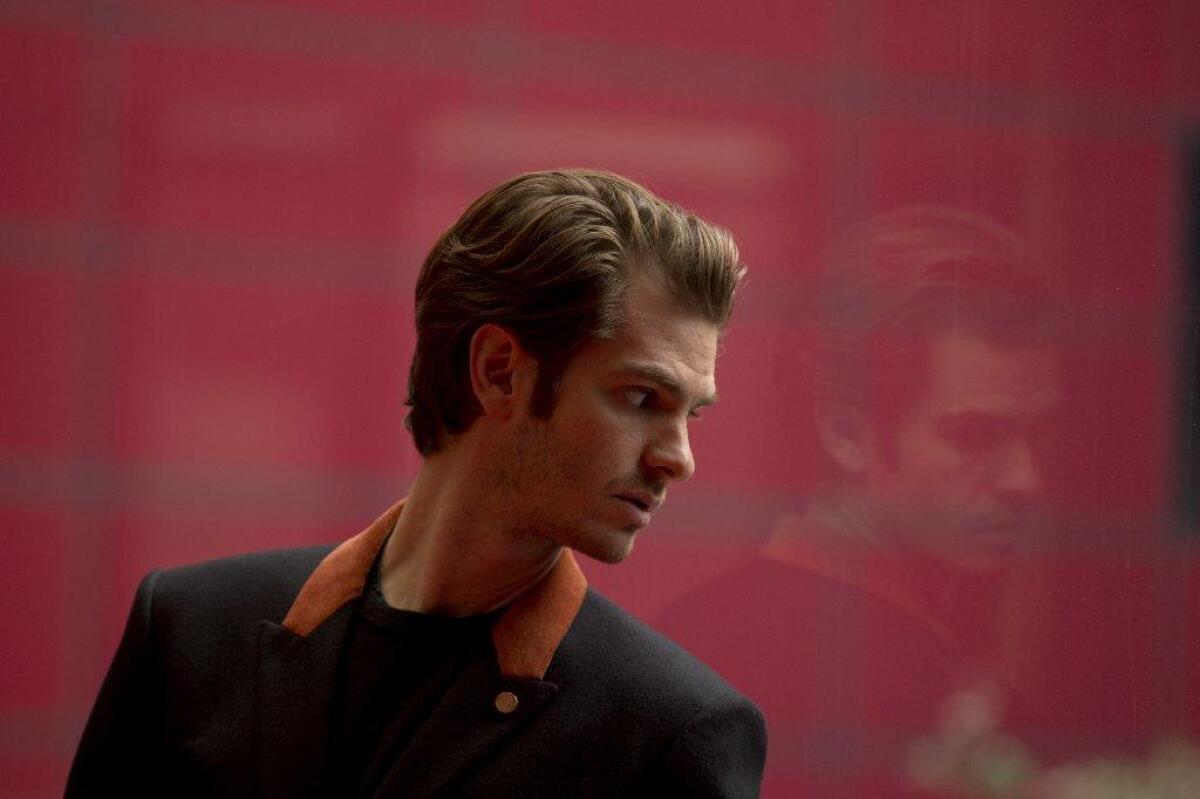
Andrew Garfield has been busy this past year, delivering performances in two of the year’s best movies, “Silence” and “Hacksaw Ridge.” The critical acclaim of his turn in the Mel Gibson-directed picture nabbed him an Oscar nomination Tuesday morning for best actor.
Shortly after the announcement, Garfield spoke with The Times from London about the recognition:
Where are you now?
I’m in London rehearsing a play, “Angels in America,” at the National Theater on the South Bank in London. I just finished my first morning rehearsal and went to lunch at the canteen and my agent called me screaming. I kind of assumed it was a good scream.
This is your first Oscar nomination. How does it feel?
I’m still feeling it—I can’t describe it really. All actors, before they know they want to be actors, even people who aren’t actors, fantasize about winning an Oscar. The best thing that can happen is to have someone affected by the work you’re doing. I feel very deeply reassured that I’m on the trajectory that I’m supposed to be on. I’m doing what I’m supposed to be with my life at this point. If there was any doubt in my mind —and there’s always a lot — the academy members, whose opinion I value, seem to think I’m on the right track.
Are you particularly happy that the film you were nominated for bears a pacifist message during a time of global turmoil?
Absolutely. To be a vessel for a story that is urgent for the times we’re in, for me as an actor, is all I can wish for. I think the world is crying out for this story and that is the ultimate gratification. To think, you’re adding something healing and soulful to the culture, something that’s authentic. People can feel it when something healing and beautiful and loving is happening. I think Desmond Doss was a personification of love. Those are virtues the world needs now. We need humility and we all need to show up as ourselves in all our unique callings.
I’m so inspired by the women’s march and everything else that is happening in terms of rallying against this culture of separatism and alternate facts, and the lies that are being peddled, and the ego that is being lived out. Desmond Doss was the antithesis of these qualities. Everyone is being woken up and called to action in some way. I just hope we do the unique thing that we are called to do. Not one of us can fix things; it’s going to take every human being to shift the tide. America won’t be brought down by one man’s ego.
Mel Gibson congratulated you by name in the reaction statement he issued. How does that make you feel?
It’s wonderful! This film is a real partnership. My performance as Desmond is as much Mel’s as it is mine. It’s as much of Vince Vaughan… and the rest of the battalion of lads. Every nomination or award is an ensemble one. All this means is that I was held up and supported by incredible artists, and above all, Mel, who really shaped this performance with me and [editor] John Gilbert in the edit room.
- Share via
A look inside the novel-free category for adapted screenplay for this year’s Oscars
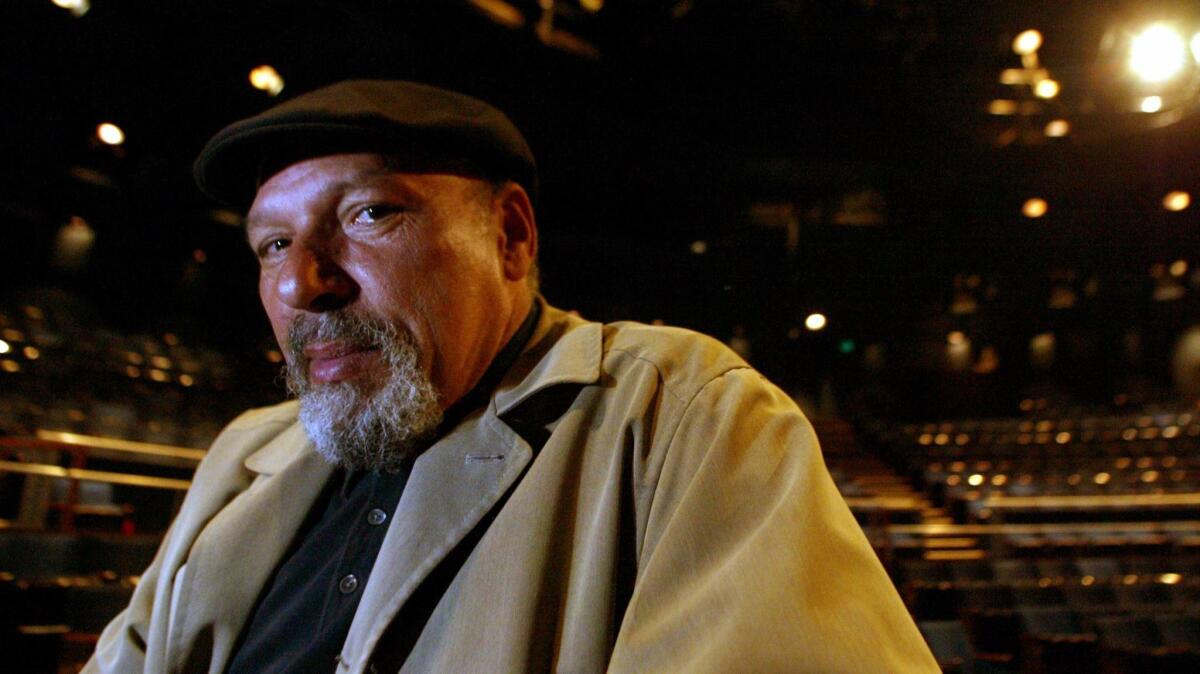
If you’re both an avid reader and a committed movie buff, you can pass the time before the 89th Academy Awards ceremony on Feb. 26 by dipping into the sources of the adapted screenplay nominees. But you won’t be reading any novels.
Two nonfiction books, two plays and one short story inspired the Oscar nominees for Adapted Screenplay: “Arrival,” “Fences,” “Hidden Figures,” “Lion” and “Moonlight.”
For the first time since 2013, none of the nominated screenplays this year is based on a novel. Here’s more about each of the nominees.
“Arrival”
It’s not often that a screenplay based on a short story (“Arrival”) makes the cut — the last was in 2008, when “The Curious Case of Benjamin Button,” based on a story by F. Scott Fitzgerald, was nominated.
“Arrival,” written by Eric Heisserer, is an adaptation of Ted Chiang’s “Story of Your Life,” the Nebula Award-winning tale of a linguist recruited by the government to communicate with aliens.
- Share via
Shawn Levy on how the alien encounter ‘Arrival’ turned out to be more timely than filmmakers imagined
“Arrival” producer, Shawn Levy called in from the Upside Down while directing on the set of Netflix’s “Stranger Things” to talk about the, ahem, arrival of the movie’s many Oscar nominations.
This is a big day for “Arrival.” Did you see it coming?
It’s a good day! Given the ride we’ve been on since our festival premieres in the fall, we certainly hoped that it might all lead to a day like today. It was never something we contemplated over the past five years that it took to get this movie made, but seeing the reaction to our film, both commercially and critically, it definitely stoked the flames of hope. And today has us over the moon happy.
Where were you when you got the good news?
I’m also directing “Stranger Things” right now, and I am literally in the Upside Down today. I got the news of our Oscar nomination in the Upside Down.
How have others from the film reacted?
My first call was from Amy [Adams] who is so thrilled with the various ways in which the movie is being recognized and nominated. Amy is the most giving, gracious human being, and I personally feel like “Arrival” in anchored in every frame by Amy Adams, so to acknowledge the movie to the extent that the Academy has, is an acknowledgement of Amy’s genius.
Given the nuance and layers of meaning reflected in “Arrival,” do you feel the that the film is particularly timely?
I do. We never knew the extent to which a movie about communication, collaboration, and the duality of fear and hope would be topical. The movie has turned out to be so much more timely than we ever imagined, but I’m grateful for that. “Arrival” is about the obstacles to connection and communication, and the overcoming of those obstacles. What better lesson can we ask for?
How will you celebrate?
I’m literally going to celebrate by continuing to direct “Stranger Things” all day, and then I will have a very cold beer after wrap.
- Share via
‘The Red Turtle’ director on bringing his ‘handmade’ animated movie to the Oscars
For director Michaël Dudok de Wit, seeing his film “The Red Turtle” get nominated for an Oscar for animated feature was a shock. “The competition was really strong,” he said from his home in London. “I knew our film had a chance. It was unlike any of the other films. But many other films had a huge chance, I think. I was honestly quite nervous!
“On top of that, another French film was nominated, ‘My Life as a Zucchini,’ also handmade like our film. ‘Kubo’ was mostly handmade as well. I’m just delighted with all the nominees and of course, for our film and my team.”
How did the project first come together, from such disparate cultural backgrounds and influences?
It’s a miracle. It was a very unlikely cooperation. [Studio Ghibli co-founder/”Red Turtle” artistic director] Isao Takahata has a mind that is interested in European culture, and I love Japanese art and traditional art especially. We were from totally opposite parts of the world and we each had an openness and a curiosity about each other’s culture.
What was behind the choice to tell this story without dialogue?
The whole thing started with an invitation from Studio Ghibli saying, “If you want to make your first feature film, we are interested in making it.” It was a total dream offer – it was so surreal. I’ve seen and admired all of their films, and on top of that they are very independent-minded. My reply was, ‘Yes, of course!’
In the beginning I had some dialogue in my script, just a few moments to feel closeness to the main characters. We experimented with that but … at some point in development, we dropped all the dialogue. But I felt strongly that it should feel as though the people in the film can talk, and they do – it’s just that in our film we don’t see them talk. We wanted it to be very natural.
What does it say about the academy and the animation community that such a diverse spectrum of animated films were nominated this year?
It’s striking: On one hand, the members have voted for some very solid quality computer-animated films which have a traditional approach to the story. And on the other hand, they chose two films from Europe that were handmade, made on a small budget, and a film from Oregon with puppet animation which was beautifully, beautifully made. In other words, they clearly had a very open attitude. Some films are more experimental than others, but they all have a place among the nominations.
- Share via
None of this year’s best picture nominees has crossed $100 million at the box office (so far)
Not to rain on the parade of this year’s many highly worthy Oscar nominees, but the fact is, most of the best picture nominees have not been all that widely seen, at least by the standards of mainstream Hollywood blockbusters.
As of Tuesday morning, none of the nine films nominated for best picture has crossed the $100 million mark at the domestic box office – so far.
While that’s not unprecedented, it’s only the fifth time that’s been the case in the past 20 years. (In 2009, the motion picture academy expanded the best picture race from five nominees to as many as 10, in large part to try to open the Oscars up to more broadly appealing films.)
Three of this year’s best picture nominees — “La La Land,” “Hidden Figures” and “Arrival” — are within striking distance of the $100 million milestone domestically. “Arrival” is the top earner at this point with more than $95 million, but it is in a dwindling number of theaters after two months in release, while “La La Land” and “Hidden Figures,” which have fresher legs, will keep on chugging for weeks.
The grosses for some of the other films in the race, however, like “Moonlight” and “Lion,” which each have earned $16 million so far, have been more modest to date.
The Oscar nominations will give many of these films a second or third wind at the box office – “La La Land,” powered by its 14 nominations, should have a particularly strong run ahead.
Still, in the end, this year’s best picture race is unlikely to include a global box office smash on the scale of such recent best picture nominees as “American Sniper” ($547 million), “The Revenant” ($532 million) or “The Martian” ($630 million).
How will that impact the viewership for the Oscars telecast? We’ll have to wait until Feb. 26 to find out.
But it’s safe to say that long shot best picture nomination for “Deadpool” — which earned $783 million worldwide — would have goosed the ratings up a notch or two.
- Share via
Lin-Manuel Miranda was watching Roger Federer instead of his ‘Moana’ Oscar nomination announcement
Lin-Manuel Miranda appeared to be more interested today in Roger Federer’s Australian Open performance than in his own Oscar nomination for the “Moana” original song “How Far You’ll Go.” He shared the details on Twitter.
The EGOT-hopeful was laser-focused on a tape-delayed Federer match when his agent John Buzzetti called with the news. A “very grateful” Miranda then shared it with his wife, Vanessa Nadal.
But then it was back to tennis.
His son offered congrats as well — about something completely different.
- Share via
Todd Black’s Oscar morning and why white and black audiences love ‘Fences’
With the Oscar nomination of “Fences” as best picture, Todd Black — co-producer of the film with Scott Rudin and Denzel Washington — is up for his first Academy Award after a long producing career.
Reached Tuesday morning after the nomination news was announced, he says he is “super, super happy right now.”
Unlike some nominees who’ve said they were barely aware that the nominations were happening until getting a surprise call, Black says, “I went to bed thinking about it.”
When his alarm went off at 5:10 a.m., he woke up his wife.
“We turned on the TV and we had both of our dogs in our bed,” he says. “We all four watched it and held our breath, and then screamed really loud when they announced Denzel, Viola, the screenplay and the picture. Our dogs looked at us like we were crazy, and they started running around the room. And we started running around the room. It was a really fun morning. My phone hasn’t stopped since.”
Black has worked with Washington before — the two were co-producers with Randa Haines on the film “Antwone Fisher.” He says that the fact that “Fences” has resonated so well with audiences and his peers is especially gratifying.
READ: How August Wilson’s ‘Fences’ went from stage to screen
“That’s the thing I’m most excited about,” he says, “besides the nominations. Our film is successful — not just incredibly financially so, but with regular everyday people who are not in the movie business. They have really embraced the film.
“It wasn’t just an African American audience, it was everybody. During a number of screenings, people would say to us, from Poland or Japan or wherever they were from, ‘Boy, that’s like my grandparents. That’s like my father. That’s like my mother. That’s like me. That’s like my brother.’ ... I think the thing that’s so satisfying is the universality of what August Wilson has written and what Denzel directed. It’s culturally an African American film, but it’s universally a subject for everybody. That’s what I’m most proud about.”
As for the rest of Black’s day on this Oscar nomination Tuesday, he says, “I’ve got a couple more of these phone calls and ... interviews to do, and then I have meetings to go get the next movies going. As a producer, you have to enjoy the moment, but you also have to keep going and put out another — hopefully another good one, for the world. It doesn’t stop.”
- Share via
‘Rogue One’s’ John Knoll says visual effects Oscar nod represents ‘a team effort’ of 800
“Rogue One: A Star Wars Story,” which just crossed $1 billion at the global box office, pulled in two Oscar nods Tuesday morning, for visual effects and sound mixing.
On the one hand, that’s three fewer than 2015’s “The Force Awakens” earned last year – and eight fewer than the original 1977 “Star Wars” got. On the other hand, it’s a better showing than the prequels “Attack of the Clones” and “Revenge of the Sith,” which earned one nod apiece.
In a statement Tuesday, Industrial Light and Magic Chief Creative Officer John Knoll gave a nod to the hundreds of people who had worked on the film’s visual effects.
“Although the Academy only recognizes 4 people on the nomination itself, visual effects is truly a team effort and we had an incredible team on this film,” Knoll said. “On behalf of the nearly 800 artists, technicians and production folks around the world that contributed tirelessly to the work you see on screen and equally important, everything that goes on behind the scenes to make it happen, we are deeply honored to receive this recognition.”
- Share via
‘It was insane’: At 20, Lucas Hedges is this year’s youngest Oscar nominee in the acting categories
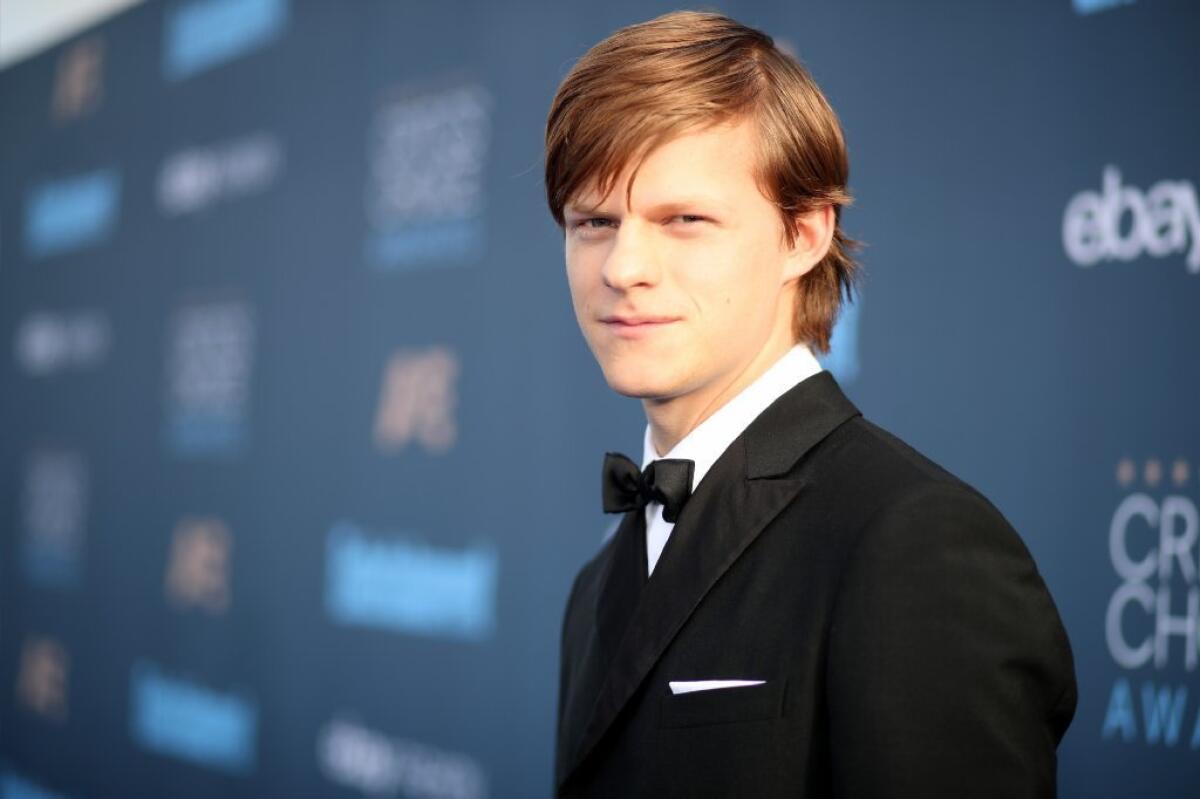
The night before finding out he’d been nominated for his first Oscar, actor Lucas Hedges took a red-eye flight from Los Angeles to New York. Even though his mom told him to sleep in, to take his mind off the upcoming news, Hedges was restless.
“Maybe my body knew. I woke up and I thought I’d check my phone, and immediately I got a call from my publicist,” he told The Times. “I jumped out of bed ran and screamed to my parents. My dad jumped out of the shower. … It was insane.”
“I grew up with the Oscars, and we had people over every year for the [ceremony]. It’s insane to be nominated,” he said again. “It doesn’t make any sense.”

“Manchester By The Sea” stars Kyle Chandler, Michelle Williams and Casey Affleck.
At 20, Hedges is the youngest Oscar nominee this year in the acting categories for his role in “Manchester by the Sea.” He’s up for supporting actor alongside Mahershala Ali (“Moonlight”), Jeff Bridges (“Hell or High Water”), Dev Patel (“Lion”) and Michael Shannon (“Nocturnal Animals”).
“I can’t help but think about both Leonardo DiCaprio and River Phoenix, who were about my age,” Hedges said. “They’re the two greatest young actors in American history. It’s amazing to be honored for the same award that they were honored for, at the same age.”
But it’s back to work for the young actor, who is currently in an off-Broadway play.
“I get to celebrate by doing this show and maybe going out with my cast afterwards. I just have to go back onstage and give it my all.”
- Share via
August Wilson, the man behind ‘Fences,’ lands Oscar nomination 12 years after his death
When August Wilson received word in 2005 that he had inoperable Stage 4 cancer, he had not yet accomplished two major goals in an already notable and historic career.
“I think he felt proud of his achievements and faced death the way he faced life: courageously and uncompromisingly,” said Constanza Romero, Wilson’s widow who was also his costume designer and all-around sounding board. “But August wanted two things to happen that hadn’t happened. He wanted ‘Jitney’ [his 1970s-set play about Pittsburgh taxi drivers] to finally be on Broadway. And he really, really wanted this movie to come into being.”
“This movie” is an adaptation of his 1983 stage masterwork “Fences,” which Wilson had been working on for so long that it at one time had cast a red-hot Eddie Murphy … as a teenage character.
Five months after the diagnosis, Wilson died, the drama no closer to reaching the screen than when Paramount had optioned it in 1987.
More than a decade later, “Fences” is a feature-length production and has landed Wilson, who wrote the screenplay before his death, an Oscar nomination for the film directed by Denzel Washington and starring Washington alongside Viola Davis. (Both also received nominations for their roles.)
While at least one person has been nominated (and won) an Academy Award more than a decade after their death -- film composer Larry Russell, who won 18 years after he died for the Charlie Chaplin film “Limelight” -- most Oscar winners honored posthumously are recognized within a year of their passing.
- Share via
Before ‘Moonlight’ was an Oscar-nominated movie, it started as a play we never got to see
For Tarell Alvin McCraney, watching “Moonlight” isn’t the wonderfully transformative experience it is for film critics shouting its praises. It’s emotional. It’s painful. It’s struggle, embodied. After all, the movie is quite literally his life playing out onscreen, just with actors as the men and women he knew and loved some 20, 30 years ago: his drug-addicted mother, the local drug dealer turned father figure, the first guy with whom he was ever intimate.
“It’s a palpable snapshot of memories and dreams that is difficult to sit through,” he said. “The first time I saw it, I went through a pretty bad depression. The second time, I burst into tears midway through. It’s hard. It’s rough.”
- Share via
L.A. Times portraits of the nominees for the 2017 Academy Awards
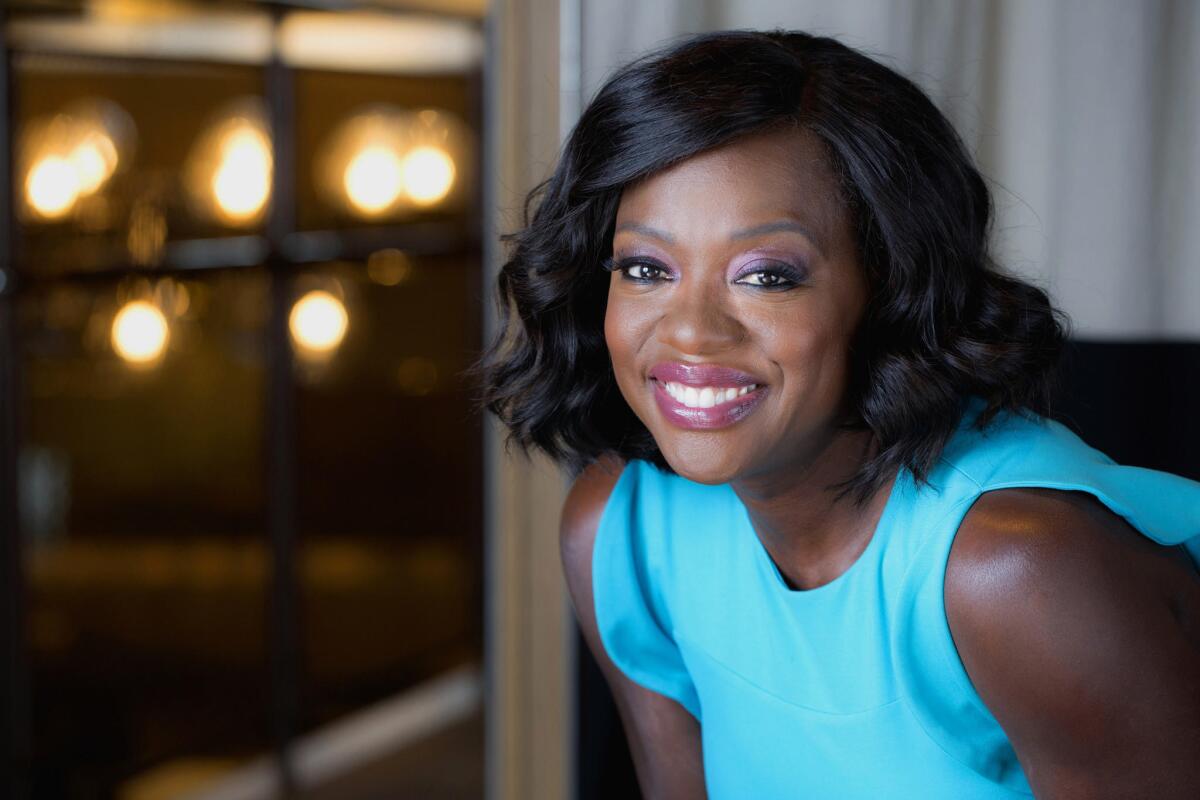
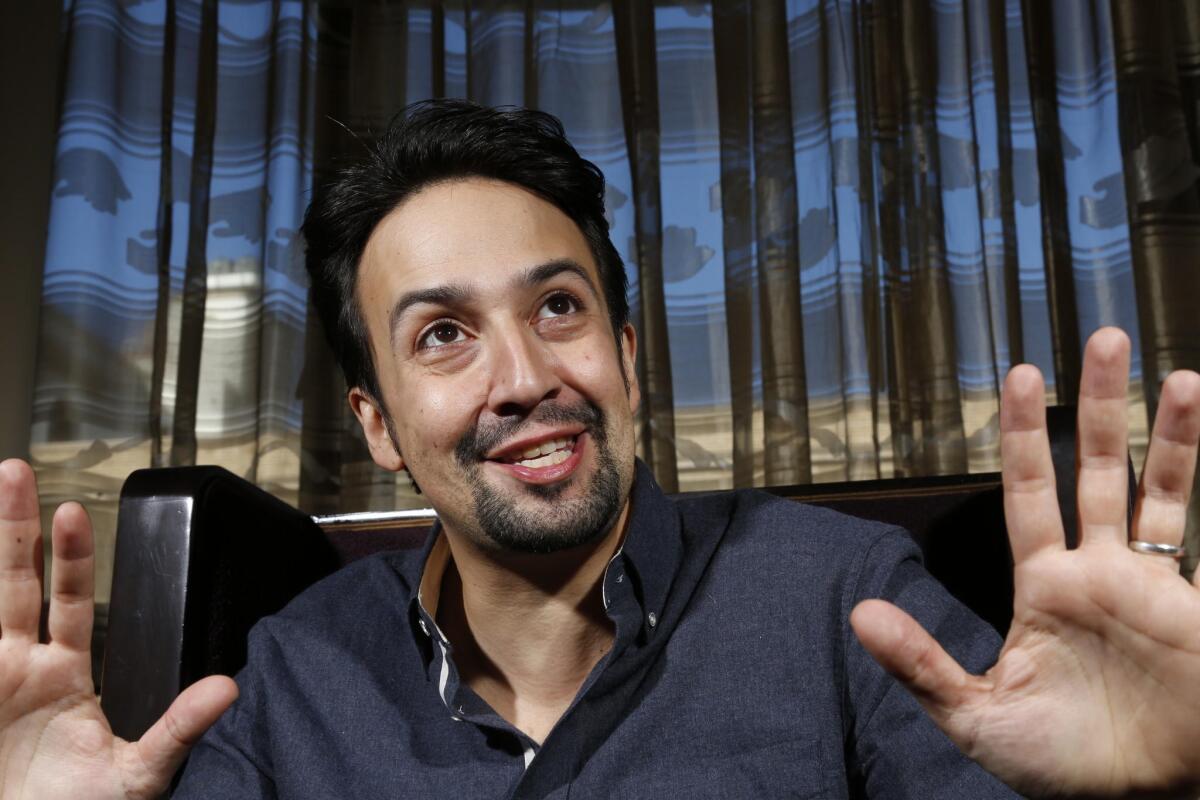

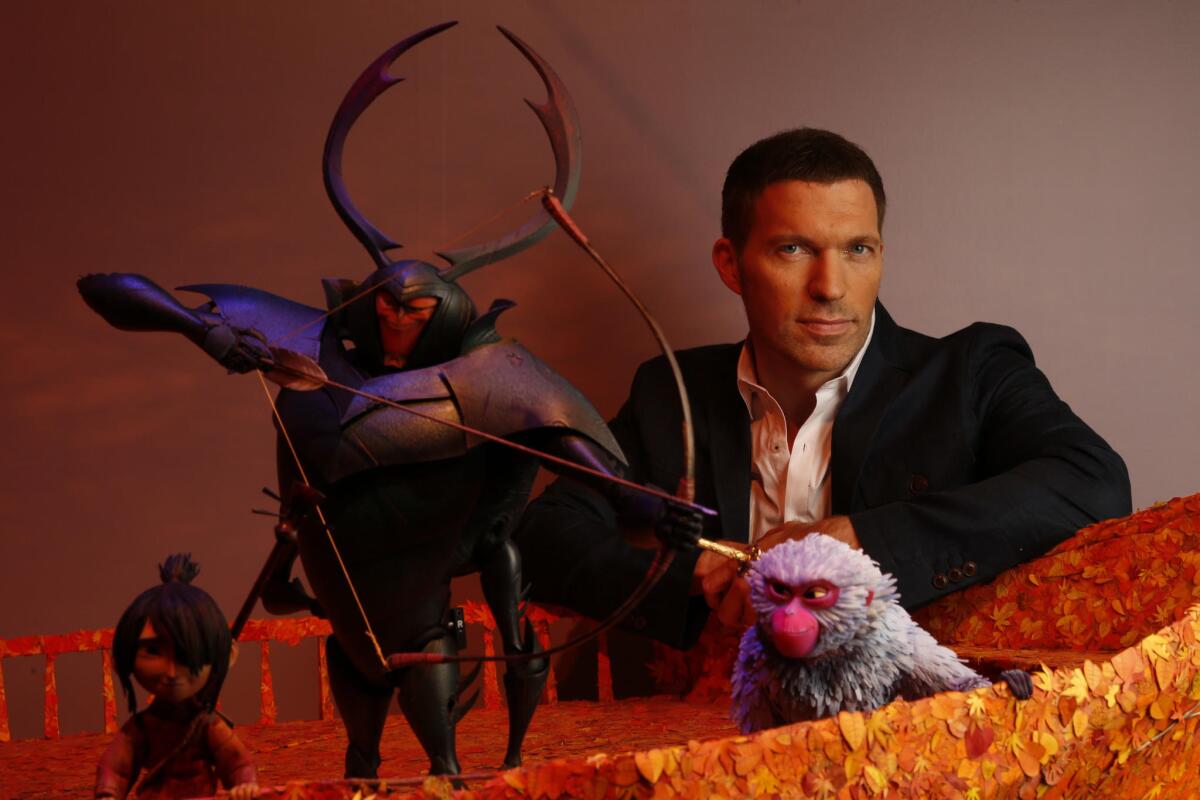
- Share via
Besides ‘Moonlight,’ Oscar nominations show the Academy likes to reward the familiar
Hollywood recognizes its own.
No matter how many old veterans leave the Academy of Motion Picture Arts and Sciences and how many new recruits arrive, the nature of the choices the membership makes rarely varies: The voters like what they’ve always liked.
They may want it in different packages, they may try to mix and match, but certain kinds of satisfactions are bred in the bone and will not be denied.
This dynamic was visible all across the 2017 Oscar nominations, starting with a record-tying 14 nominations for Damien Chazelle’s “La La Land.”
That film hit the jackpot by combining the traditional form of the musical with modern plotting and charismatic, up-to-the-minute stars Ryan Gosling and Emma Stone. And the fact that the whole thing was set on Hollywood’s home turf certainly didn’t hurt.
Also benefiting from this dynamic was “Hell or High Water,” a modern version of yet another venerable genre, the western. Set in today’s West and touching on contemporary economic problems but peopled with familiar law-and-order characters, “Hell” took home four nominations, including best picture, best original screenplay, best supporting actor for the much loved Jeff Bridges, and best editing into the bargain.
Yet another case of well-worn genres rewarded for being brilliantly reimagined was science fiction standout “Arrival,” which took the old-school “They’re here” alien visitation trope to exceptional places and ended up with eight nominations, tied with “Moonlight” and second only to “La La Land.”
Yet, in a perfect example of Oscar perverseness, though “Arrival’s” success is impossible to imagine without star Amy Adams, she was not nominated in the best actress category. Go figure.
Also completely traditional in almost every way, except possibly in the inescapable tragedy of its plot, was Kenneth Lonergan’s magisterial “Manchester By The Sea,” which was rewarded with six top-of-the-line nominations: its three stars, picture, director and screenplay.
“Moonlight” would seem to be an exception to this tradition rule. After all, stories about growing up poor and gay and black with a crack-addicted mother are hardly standard Hollywood fare.
But, in a way that still seems almost miraculous, director Barry Jenkins and his collaborators gave this story the kind of emotional transcendence that the best Hollywood films have always aspired to, and even in unfamiliar surroundings the academy saw and recognized that.
- Share via
Photos: The top 2017 Academy Award nominees
Take a look at this morning’s top-nominated films.
- Share via
Michelle Williams makes her Oscar nomination a ‘Manchester by the Sea’ family affair
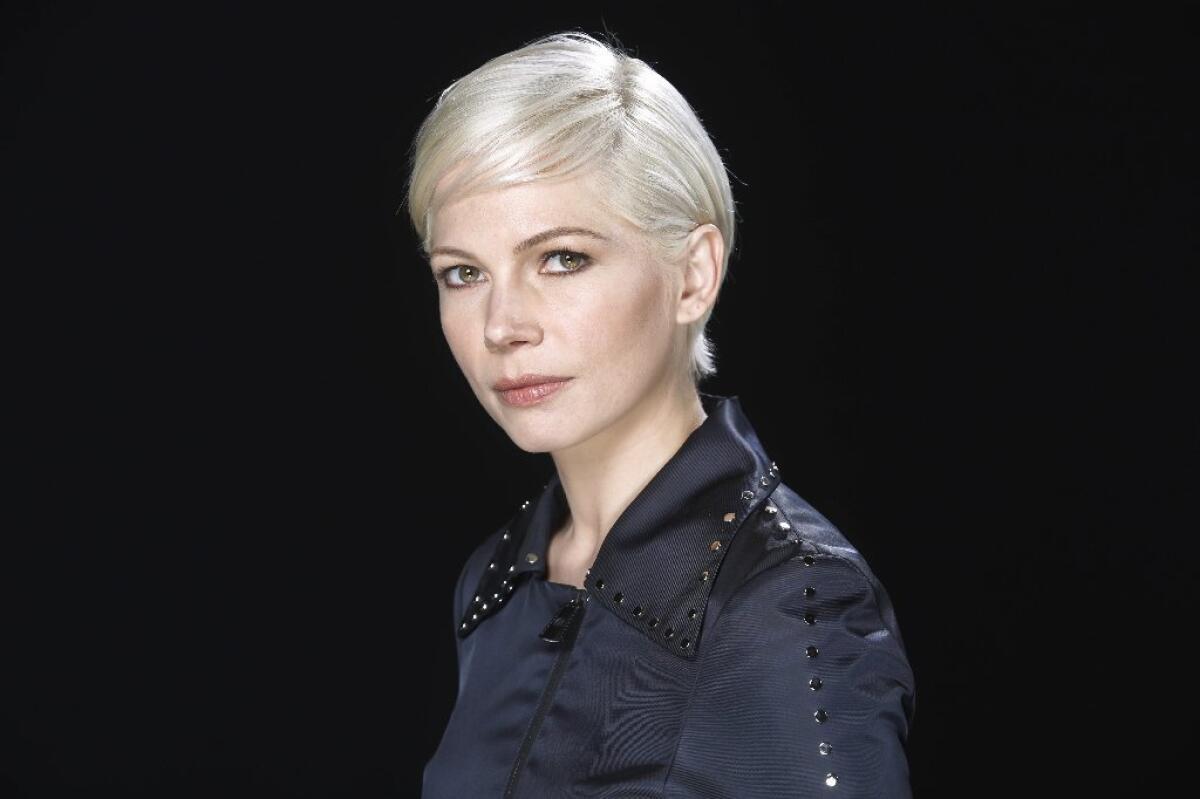
Thank you so much to the Academy for this recognition. Making this film was incredibly rewarding, and none of it would have been possible without the guidance from our fearless leader, Kenneth Lonergan. I am thrilled to share this nomination with Kenny, Casey, Lucas and the rest of the cast, producers and crew. Congratulations to my fellow nominees. It is truly an honor to be included among such amazing women in this category.
— Michelle Williams, supporting actress Oscar nominee for her work in “Manchester by the Sea”
- Share via
Oscar nominations’ biggest snubs and surprises: ‘Dory,’ Meryl and Mel
Just a couple of weeks after our new president labeled her “one of the most overrated actresses in Hollywood,” Meryl Streep earned her 20th Academy Award nomination Tuesday.
Not that the news seemed particularly momentous to the 67-year-old. The best actress nominee -- who earned her latest nod for playing a tone-deaf singer in “Florence Foster Jenkins” -- conveyed her reaction to the news via a GIF of her jumping around in a 2013 Paul McCartney music video. (Most nominees traditionally do interviews following the nominations or issue a polite, noncontroversial statement of thanks. Then again: Streep isn’t most nominees.)
Though Streep is an award season staple, many were actually surprised by her Oscar nomination. Her performance in “Florence” was not one of her better-reviewed turns, and pundits predicted her slot would go to Amy Adams (“Arrival”) or Annette Bening (“20th Century Women”). But at the Golden Globes this month -- where she was the recipient of a lifetime achievement award -- Streep delivered a stirring six-minute speech denouncing then President-elect Donald Trump. It was arguably the most rousing moment of the telecast, and may have swayed Oscar voters in her favor. (The Globes took place on Jan. 8; Oscar ballots were due Jan. 13.)
One of the biggest shockers at the Globes, meanwhile, came when Aaron Taylor-Johnson was named best supporting actor for his performance in “Nocturnal Animals.” Leading up to that award show, most critics had singled out the actor’s co-star -- Michael Shannon -- as the more likely nominee. Shannon got his due from the Academy, however, in a slot that many had guessed would go to Hugh Grant, who also appeared in “Florence Foster Jenkins.”
In the animated film category, Pixar’s “Finding Dory” — which has grossed over $1 billion at the box office — was shut out. (And you can count on one hand the number of times a Pixar film hasn’t gotten a best animated feature nomination and still have fingers left over.) Instead, the far lesser-known French-Swiss stop-motion animated film “My Life as a Zucchini” scored some recognition. The foreign film, about an orphan struggling to find his place in a foster home, has yet to be released in American theaters.
Another big surprise Tuesday morning came when the World War II drama “Hacksaw Ridge” earned six nominations, including nods for best picture, lead actor (Andrew Garfield) and best director (Mel Gibson). Gibson, whose anti-Semitic and misogynist rants have made him a TMZ staple over the last decade, edged out industry favorites Martin Scorsese (“Silence”) and Clint Eastwood (“Sully”).
“It was really great and emotional to see Mel be embraced and the stuff of the past finally being forgiven by Hollywood,” Bill Mechanic, the film’s producer, said shortly after the nominations were announced. “It’s just such a long, hard journey that it would have been disappointing to see the movie not be recognized.”
And “Deadpool,” it turned out, did not have enough superpower to break into the Oscar race. The R-rated superhero film, which was a commercial hit and earned two nominations at the Globes — including one for picture — was not recognized by Academy voters.
- Share via
‘I’m that dork’: Lin-Manuel Miranda on his EGOT and Oscar chances
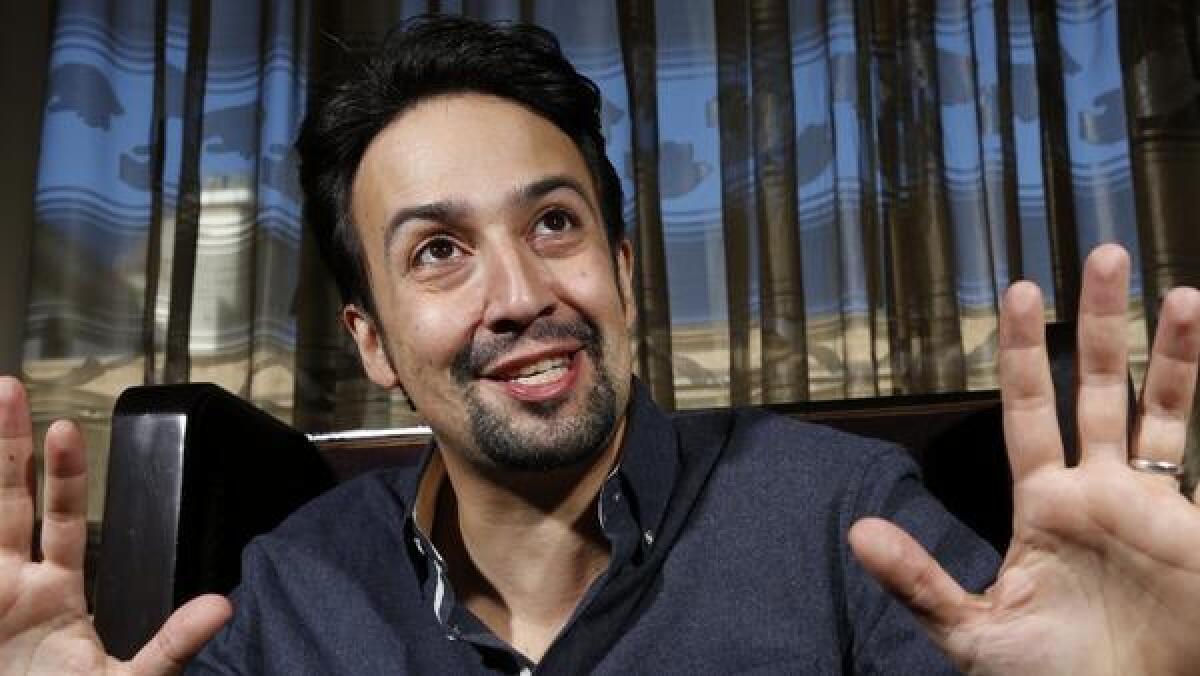
For a man with an opportunity to join one of entertainment’s most exclusive clubs, “Hamilton” mastermind Lin-Manuel Miranda was surprisingly disconnected from Tuesday morning’s Oscar nominations.
Scoring his first Academy Award nomination with his song “How Far I’ll Go” from Disney’s “Moana,” Miranda could become one of just 13 individuals to achieve an EGOT, winning an Emmy, Grammy, Oscar and Tony.
But Miranda wasn’t bound up with anxiety over the possibility. In fact, he says he’d forgotten all about the awards.
Miranda is in London filming a sequel to the Disney classic “Mary Poppins” and was on his lunch break as nominations were announced.
“I was watching the Australian Open on tape delay and eating tandoori chicken,” Miranda told The Times by phone. “Then my phone vibrated off the table.
“I still don’t know if Federer won,” Miranda quipped. (He did.)
Though the announcement of the nominations may have caught him by surprise, that’s no indication of Miranda’s excitement of being recognized by the academy.
I’m that kid who used to memorize Billy Crystal’s musical monologues where he’d make fun of all the nominated films. I’m that dork.
— Lin-Manuel Miranda
- Share via
‘What a morning’: Emma Stone on her Oscar nomination
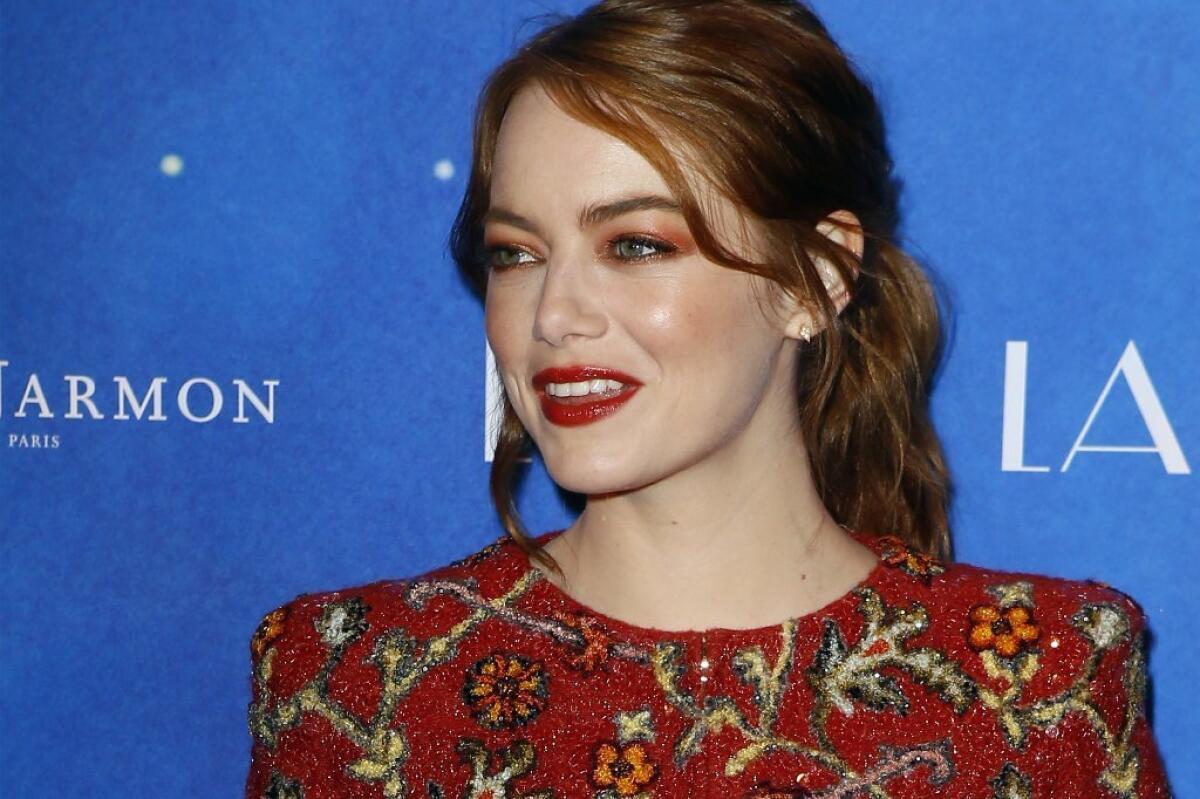
What a morning. I am so grateful for this honor and I’m so happy to share this feeling with my ‘La La Land’ family. The greatest part of life is connecting with people, and I love the deeply talented, kind and passionate people I was lucky enough to work with on this movie. I’m also overjoyed that the movie has connected with audiences in the way it has, and that it’s hopefully bringing a kick in their step to those who watch it. This is beyond any of our wildest imaginings and we can’t wait to celebrate together.
— Emma Stone on her second Academy Award nomination (and first for actress in a leading role)
- Share via
Oscars not so white, but still very male
Is it time for #OscarsSoMale? A racially diverse slate of acting nominees saved the film academy from an #OscarsSoWhite three-peat, but the list of nominated directors and writers was overwhelmingly male.
As in no women in the directors’ category. (Ava DuVernay’s “13th” was nominated for best documentary, for which there is no separate directing category.) With a nomination for “Hidden Figures” as best adapted screenplay, co-writer Allison Schroeder is the lone woman on the screenwriter lists; there is no woman nominated for best original screenplay.
Women usually make a slightly better showing in the writing categories. Last year, four of the 20 nominees were female, although 2015 was all-male. Only 17 women have won — eight in original, nine in adapted screenplay.
The director’s list is a much more famous boy’s club. In almost 90 years of Oscars, a scant four female directors have received nominations, and only one — Kathryn Bigelow for “The Hurt Locker” — has ever won.
- Share via
Can ‘La La Land,’ with its record-tying 14 nominations, go the distance?
“La La Land” passed its first audition Tuesday — and then some, earning a record-tying 14 Oscar nominations.
Now, the question is: Can it go on and land the role it has seemed destined to win since debuting at film festivals this fall? Can it take the Oscar for best picture?
For those not wanting next month’s ceremony spoiled, you should probably skip ahead a couple of paragraphs. In fact, you might want to skip ahead to next year’s Oscars.
Because no movie is going to beat “La La Land” this year.
This morning’s Oscar nominations also contained a number of other newsworthy developments. #OscarsSoWhite won’t be trending on social media, with several actors of color — Denzel Washington, Octavia Spencer, Mahershala Ali, Viola Davis, Naomie Harris, Dev Patel and Ruth Negga — earning acting nominations.
- Share via
After two years of #OscarsSoWhite, records for African American actors
Following two consecutive years of controversy over all-white acting nominations that roiled the motion picture academy and the film industry as a whole, the 2017 Oscar nominations set new records for the recognition of African American actors.
There were six black actors and actresses included among the nominees, the most in a single year in Oscar history. And for the first time ever, there was at least one black actor or actress in all four acting categories.
With her supporting actress nod for “Fences,” Viola Davis became the first African American actress to earn three Oscar nominations, while her co-star, Denzel Washington, picked up his seventh nomination.
Meanwhile, Joi McMillon became the first black woman to earn a nod in the editing category for her work on “Moonlight.” And Bradford Young became the first African American to earn a cinematography nomination for “Arrival.”
- Share via
‘Moonlight’s’ Barry Jenkins: How a kid from Miami’s projects made a movie that scored eight Oscar nominations
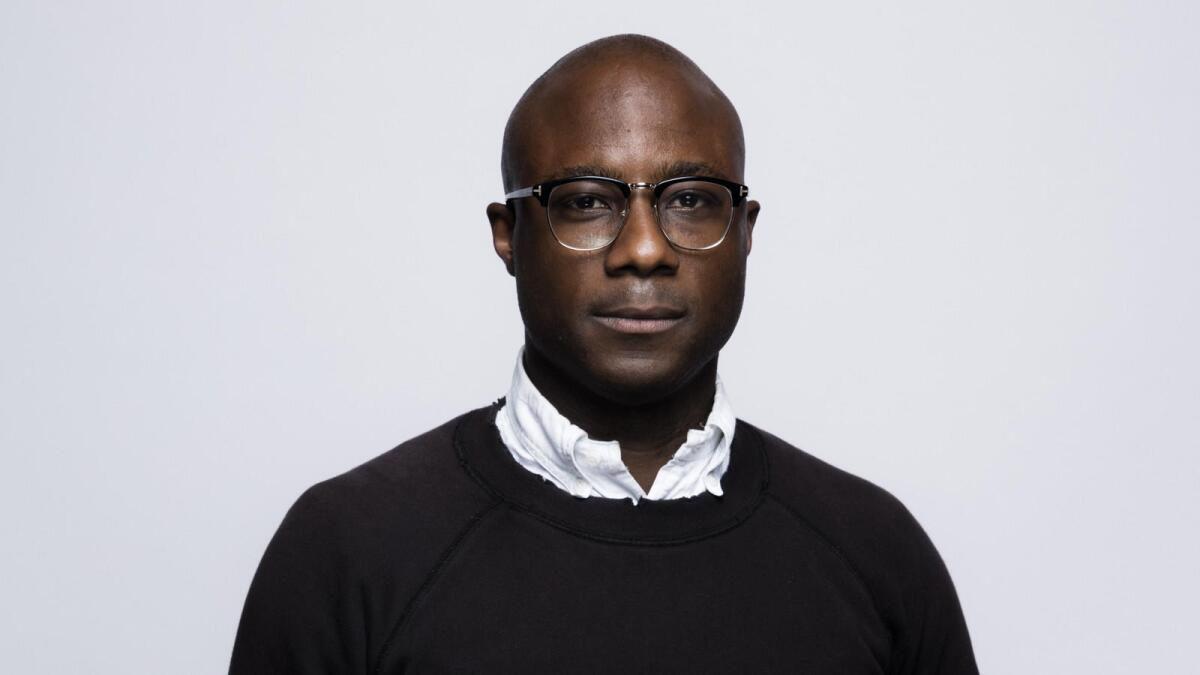
Barry Jenkins never expected his film “Moonlight” -- about a young black boy growing up in the Liberty City neighborhood of Miami, grappling with his sexuality -- to be an industry darling. But after it took the industry by storm, and nabbed the top dramatic film prize at the Golden Globes earlier this month, “industry darling” is an understatement.
Moments after the news broke that “Moonlight” was nominated for eight Academy Awards -- including best picture, director, supporting actor (Mahershala Ali) and actress (Naomie Harris), cinematography (James Laxton), original score (Nicholas Britell), adapted screenplay (both Jenkins and McCraney) -- Jenkins spoke with The Times about the honors.
How does it feel? You’ve got a couple nominations for yourself and eight total for the film.
It feels good. You know me, I’m always working so I’m in Amsterdam right now, so I don’t have the 5:20 in the morning feeling. [laughs] But, I was thinking about this... [Playwright] Tarell [Alvin McCraney] and I are basically this kid. When you watch this movie, you don’t think that kid is going to grow up and win a Golden Globe, or make a movie that gets nominated for eight Academy Awards. But now I guess I have to consider that is a real possibility. Look at where we are. It’s humbling.
Talk to me more about this idea of possibility. I’m sure many people didn’t expect “Moonlight” to take the industry by storm.
We didn’t make the movie with any expectations. I remember being at Telluride and Toronto and getting this first inkling that people were seeing something that they didn’t expect to see and, because of that, it was moving them in a way that they, and us, couldn’t anticipate.
It’s been this very grass-roots thing. People see the movie and they tell someone. I think these nominations this morning are just proof positive that enough people told a friend.
You’ve spoken so much about creating a very specific story, ignoring the idea of universality. How do these nominations give credence to that idea?
I think it shows that it’s one thing to invite an audience in, which I think we did. But once we did, we don’t try to show them things we anticipate they need to or want to see. I do think audiences, at least with this film, respect that. I give it up for the audience because they have been willing to walk a mile in Chiron’s shoes. I think they respect that I’m not trying to bring their shoes into my cinema.
You all have a bit of history with your nominations. Editor Joi McMillon is the first black woman to land a nomination in that category.
I know. That’s my homegirl. I met her my first day of film school. If there is any one of these [nominations] that I teared up a little bit over it was that one because I love Joi like a sister and I respect her work. It makes me very proud of the work she did to see that I’m not the only one. Clearly all these folks in the academy respected the work she did as well.
How you are celebrating tonight?
There’s a bottle of champagne here. Somebody was thinking ahead. [laughs] It’s not opened yet and I have to put it on ice, but I’m going to have a glass. But just one because I’m here to work and spread the word of “Moonlight.”
- Share via
2017 awards season: Track all the nominations and winners
Track all the nominees and winners during this year’s awards season in our searchable database.
- ‘La La Land’ snagged 14 Oscar nominations this morning, but how many other awards does the film have so far?
- Which other film had Ryan Gosling going home with some hardware?
- How many other major awards has Viola Davis already won for ‘Fences’?
- Share via
Michael Shannon gets honest: ‘I’ve been down in the dumps, there hasn’t been much to celebrate lately’ until now
The versatile Michael Shannon capped a year that saw him appear in 10 films -- including “Midnight Special,” “Elvis & Nixon,” “Batman v Superman: Dawn of Justice” and “Loving” -- with an Oscar nomination for his performance as a cynical detective in Tom Ford’s thriller, “Nocturnal Animals.”
He got the news in a hotel lobby in the city of Newcastle, England.
“I’m working on movie called ‘The Current War’ and was on the phone with my manager and he was watching TV and got really excited,” Shannon said.
“I really love this movie and I’m really proud to be associated with it,” he said. “For me, ‘Nocturnal Animals’ is something that happened a while ago so that time lag is a strange thing.”
On how he plans to celebrate: “I guess I’m just going to try and do another good movie. Just keep making them,” he said. “I won’t lie about it, I’ve been down in the dumps; there hasn’t been much to celebrate. It was nice to get a little pick me up.”
- Share via
Too nervous to watch the Oscars announcement, Naomie Harris ends up with a supporting actress nomination
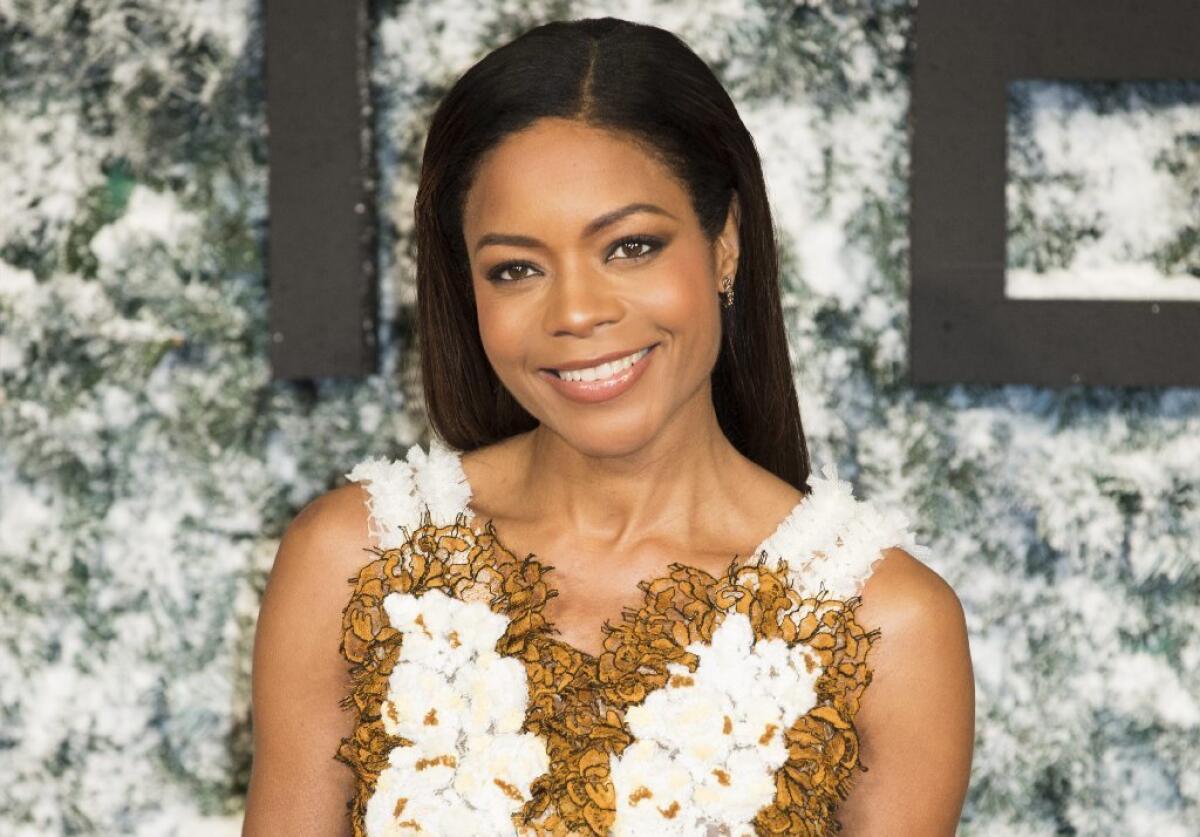
What’s the first thing Naomie Harris did after hearing the news Tuesday morning that her performance in “Moonlight” had earned her an Academy Award nomination for supporting actress?
“I was just having a lovely walk,” the British actress told The Times from London shortly after the nominations were announced. “It was very grounding.”
Harris admits she couldn’t bear to watch the live announcement.
“I was at home with my mum, and I started to watch the announcement, but I couldn’t cope with the anticipation of it all,” she says. “My brother called to say I had been nominated.”
Although “Moonlight” has been a lead contender in the run-up to awards season, Harris says she couldn’t have predicted its widespread acclaim.
“You really never know in this crazy business what’s going to resonate with people,” she says. “What I did know is that I read the script, and it made me cry three or four times. I knew it was such a beautiful film, and I knew from Barry [Jenkins’] previous film, ‘Medicine for Melancholy,’ that he was an extraordinary filmmaker.”
“Whether or not people responded to it the way I did, you can never know that,” she added. “Everyone who signed on for it did it because it was a passion project.”
Harris joins a strong cast of supporting actress nominees, including Viola Davis (“Fences”), Nicole Kidman (“Lion”), Octavia Spencer (“Hidden Figures”), and Michelle Williams (“Manchester by the Sea”). This marks the first time three black actresses have been nominated for supporting actress in the same year.
- Share via
‘I had a couple of bad moments’: How Mel Gibson went from most hated man in Hollywood to 2017 Oscar nominee
Mel Gibson was nominated Tuesday for an Academy Award in the prestigious directing category. It’s industry redemption after his years in exile from the Hollywood mainstream following a 2006 DUI arrest and blowback from anti-Semitic and racist remarks he made. In this story, first published Nov. 3, 2016, Lorraine Ali writes about Hollywood’s apparent forgiveness of Gibson, seen at an Academy screening of “Hacksaw Ridge,” and what that comeback says about the culture of fame.
--------------------------
AT THE RECENT ACADEMY premiere of “Hacksaw Ridge,” there was a 10-minute standing ovation.
Not terribly surprising, except it was for Mel Gibson.
Ten years ago, Gibson was the most hated man in Hollywood. First, during a DUI arrest, he verbally assaulted police officers using anti-Semitic and sexist language. Then he was caught on audiotape threatening his then-girlfriend with rape and other physical abuse as well as dropping the N-word.
Forget standing ovations; many believed he would never work again.
But forgiveness, like everything else, has always followed a hierarchy in Hollywood. The elite — those who’ve won awards, broken box office records, sold successful franchises — are often welcomed back even as newbies like Nate Parker or middlings like Lindsay Lohan are cut loose.
Certainly Gibson remains one of the most established figures to have fallen from grace. The star of a string of iconic films, including “Mad Max,” “Gallipoli,” “The Year of Living Dangerously” and the “Lethal Weapon” series, he was well-liked, even beloved. More important he was, for decades, a proven moneymaker both as an actor and a director, even with controversial films such as “The Passion of the Christ.”
But a different ranking system may have played a more important, and more disturbing, role in the pardoning of Mel Gibson.
In recent years, a proliferation of shameless offenses have not just lowered the bar, they’ve knocked it clean off the field. . . .
In the wake of Bill Cosby, Charlie Sheen, Paula Deen, Chris Brown or Billy Bush, forgiving Mel Gibson doesn’t seem so absurd after all.
ALSO
- Share via
‘La La Land,’ diversity and the return of Mel Gibson: The highlights of the 2017 Oscar nominations
The effervescent, brightly colored romantic musical “La La Land” – a love letter to the city of Los Angeles and the movies themselves – sang and danced its way to a whopping 14 Academy Award nominations on Tuesday morning, tying the all-time record held by “Titanic” and “All About Eve.”
But Oscar voters also spread their love far and wide, with eight other films across a wide range of genres competing against “La La Land” for best picture: “Moonlight,” “Manchester by the Sea,” “Arrival,” “Lion,” “Fences,” “Hell or High Water,” “Hidden Figures” and “Hacksaw Ridge.”
Along with “La La Land,” the year’s two other awards season juggernauts – “Moonlight,” a coming-of-age film about a gay African American boy growing up in Miami, and “Manchester by the Sea,” a wrenching drama about a man dealing with unimaginable grief – each had strong showings. “Moonlight” had eight nods in total, while “Manchester” pulled in six.
READ OUR FULL COVERAGE OF ‘LA LA LAND’ >>
After two consecutive years of all-white acting nominees, seven actors and actresses of color earned nominations, including Mahershala Ali (“Moonlight”), Denzel Washington (“Fences”), Dev Patel (“Lion”), Ruth Negga (“Loving”), Viola Davis (“Fences”), Naomie Harris (“Moonlight”) and Octavia Spencer (“Hidden Figures”).
In response to the #OscarsSoWhite controversy that roiled last year’s awards season, the Academy of Motion Picture Arts and Sciences took dramatic steps to diversify its overwhelmingly white and male membership ranks, inviting 683 industry professionals to join the institution in its most recent class, 46% of them female and 41% of them people of color.
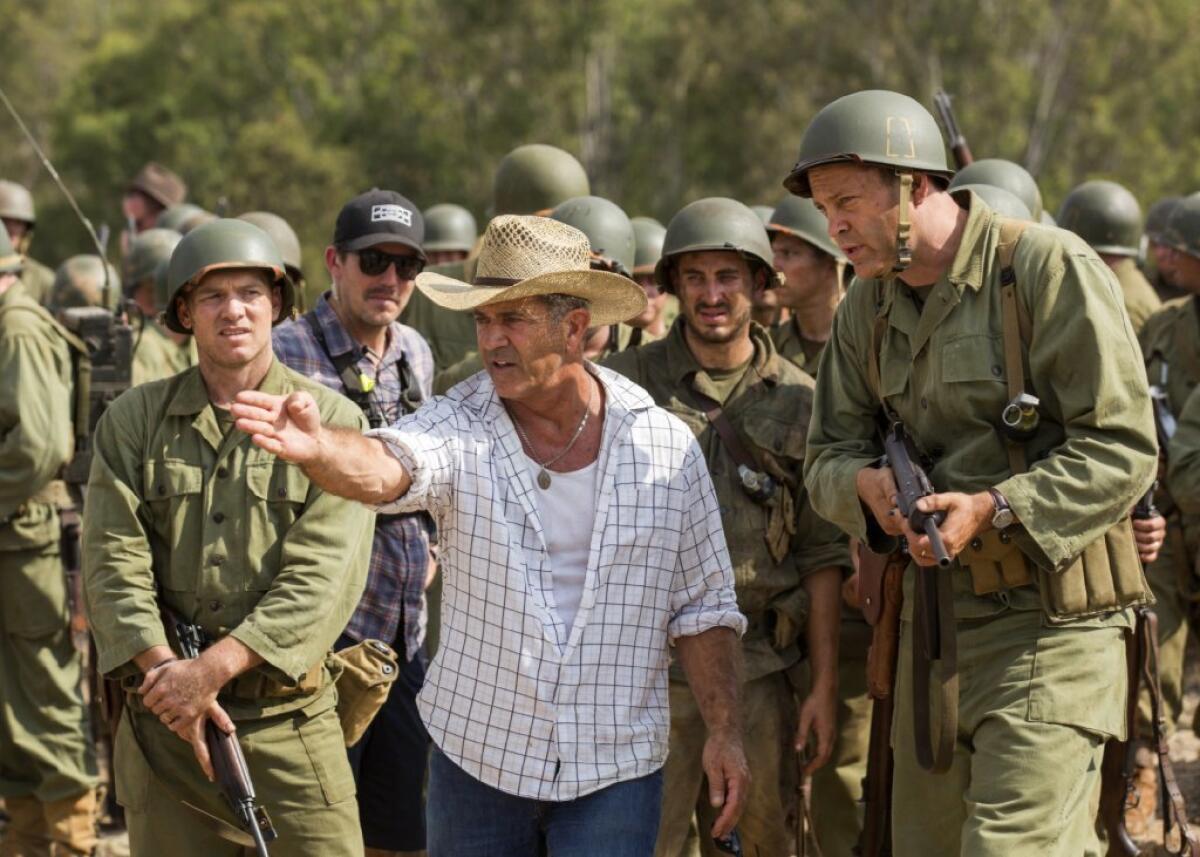
The nominations capped a noteworthy comeback of sorts for Mel Gibson. The onetime megastar-turned-industry-pariah picked up a nomination for best director for his World War II epic “Hacksaw Ridge,” which earned six nominations in total.
Rounding out the directing category were Barry Jenkins (“Moonlight”), Damien Chazelle (“La La Land”), Kenneth Lonergan (“Manchester by the Sea”) and Denis Villeneuve (“Arrival”).
Breaking with tradition, the academy announced the nominees with a live-streamed, prerecorded video featuring past Oscar nominees rather than the usual news conference.
But with a crowd-pleasing Hollywood confection such as “La La Land” dominating the nominations and the #OscarsSoWhite controversy abated for now, the awards themselves promise a return in many ways to the old-school and the feel-good.
“We want to inspire people with memories of what a best friend the movies have been over the course of their life, and we want to have a lot of laughs,” Oscar telecast producer Michael De Luca told The Times in November. “Get in, get out. No homework. All joy.”
The Academy Awards are scheduled to be handed out on Feb. 26, with Jimmy Kimmel hosting.
- Share via
‘Saturday Night Live’ shows what happens to the folks who don’t love ‘La La Land’
Despite “La La Land’s” record tying 14 Oscar nominations, not everyone is in love with the “City of Stars.” And “Saturday Night Live” host Aziz Ansari showed what happens to those who dare to protest that perhaps Ryan Gosling isn’t the best dancer on the planet.
- Share via
Meryl Streep’s response to her 20th Oscar nomination: This GIF
Meryl Streep made history today with her 20th Oscar nomination. Her response? A GIF.
“Please find the following GIF as a statement on behalf of Meryl Streep,” wrote the publicist for Paramount in an email sent to entertainment journalists Tuesday after the nominations were announced.
We wondered where the joyous clip originated. A Google image search came back with a guess: It was a picture of Paul McCartney. Silly Google. Then we learned not to doubt. Check it out at the 3:27 mark:
- Share via
Meryl Streep breaks her own record for most Oscar nominations
Looks like the Academy doesn’t think Meryl Streep is overrated.
Streep received a lead actress nomination Tuesday for her role in “Florence Foster Jenkins.” This is the 20th nomination for Streep, adding to her tally of most acting Oscar nominations for a single person. Katharine Hepburn and Jack Nicholson follow with 12 nominations each.
Streep was first nominated in 1979 in the supporting actress category for her performance in “The Deer Hunter.” Her 20 nominations include 16 for actress in a leading role and four for supporting actress.
Streep was last nominated in 2015 for “Into the Woods.” Her nominations have lead to three wins: supporting actress in 1980, lead actress in 1983 and lead actress again in 2012.
Streep, of course, was most recently honored at the Golden Globes, where she gave a political, provocative speech in accepting the Cecil B. DeMille Award for lifetime achievement.
- Share via
Viola Davis makes history as first African American actress to score three Oscar nominations
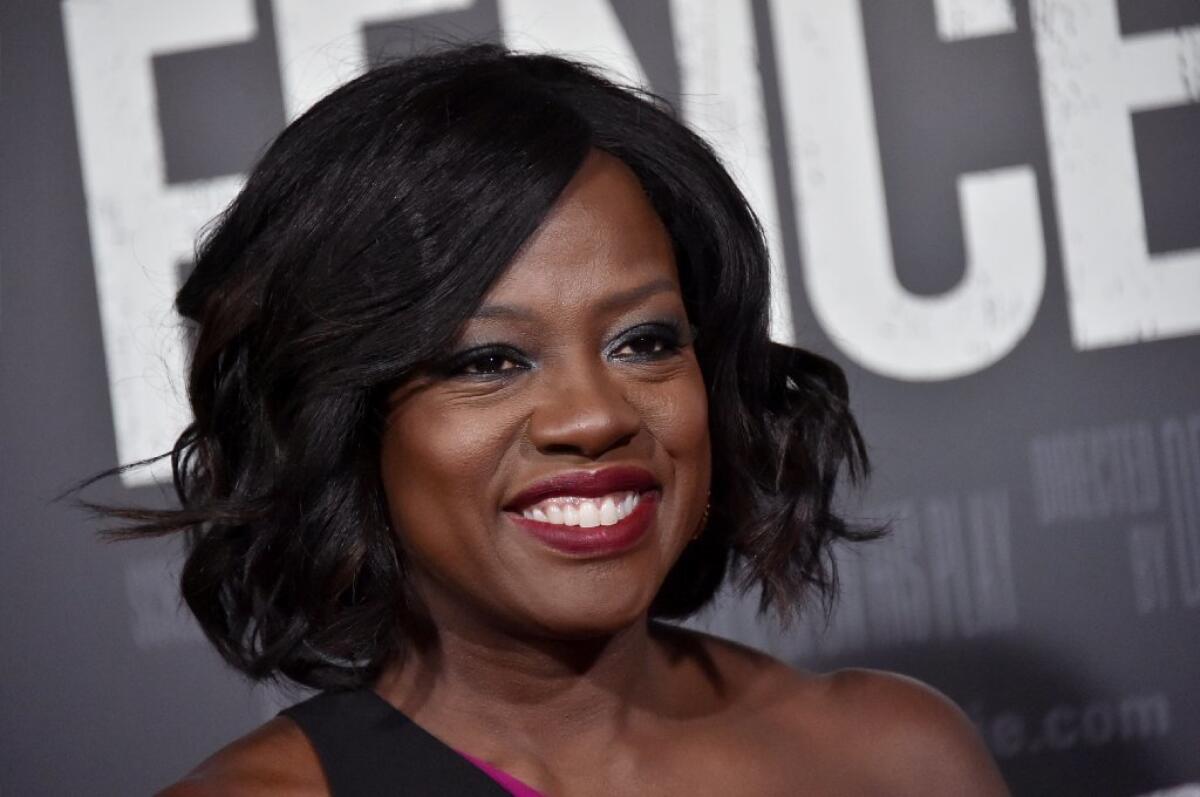
“Thank you to the Academy for recognizing this extraordinary, important film and my work in it. Thank you, Denzel, for being at the helm!”
That’s Viola Davis’ rather humble reaction to her Oscar nomination this morning for supporting actress for her performance in “Fences.”
But she deserves more than the standard congratulations. Davis is now the first African American actress to have scored three Academy Award nominations. Whoopi Goldberg previously held the record with two, having been nominated in 1986 for “The Color Purple” (actress) and finally winning for 1991’s “Ghost” (supporting actress).
Davis was nominated in 2009 for her performance in “Doubt” and again in 2012 for “The Help.” If her recent Golden Globe win for supporting actress is any indication, the third time might be the Oscar charm.
- Share via
What’s next for Oscar-nominated actor Dev Patel? A good cry in the shower
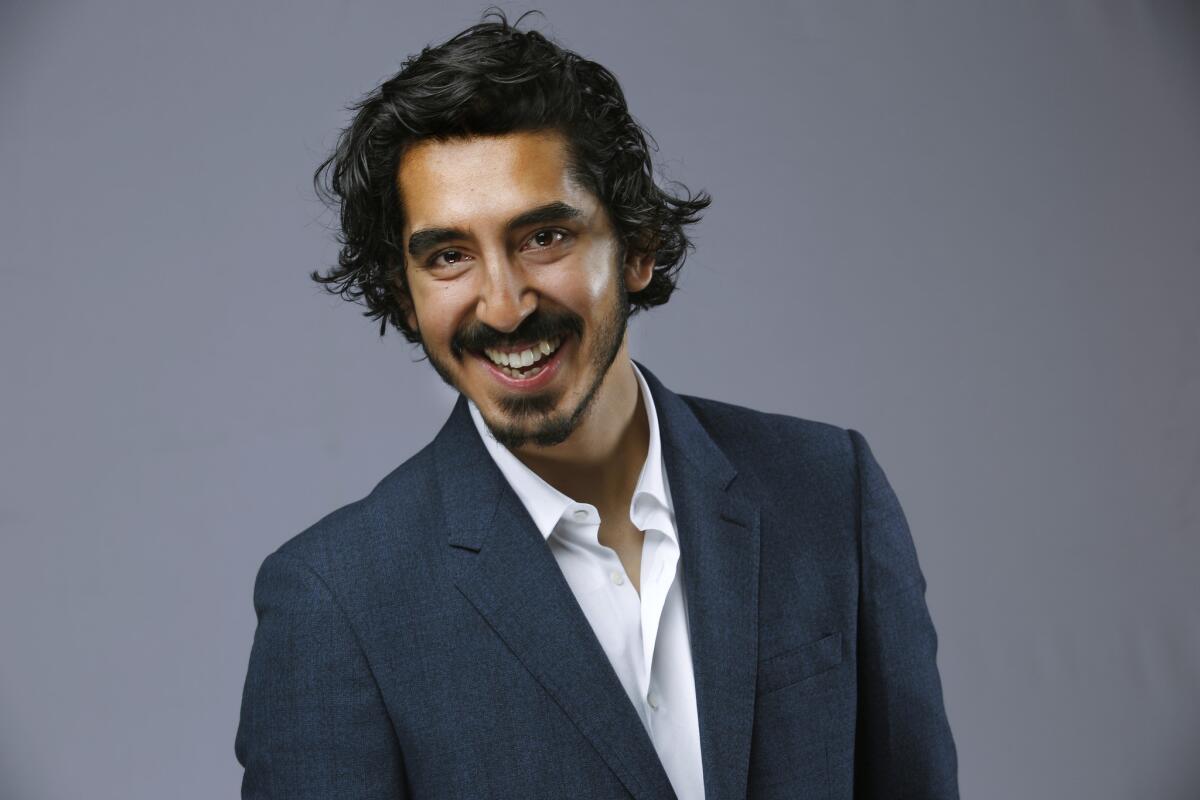
Dev Patel, who was nominated for an Academy Award for actor in a supporting role for his part in “Lion,” has big plans for celebrating his nomination news: a shower.
Are you freaking out?
That is the understatement of the century. It kind of hasn’t fully permeated my brain. I’m just so overwhelmingly grateful to the universe and the master of that universe, Garth Davis [director of “Lion”].
I am seeing on Twitter that you’re the third Indian actor to be nominated for an acting award.
Wow. Who are the other two? I need to find out. But this is just such a beautiful moment. I think it’s a time of celebration.
So you’re in India filming a new movie?
Yes, “Hotel Mumbai.” It’s 7:30 p.m. I’ve been out here for two weeks. We’re just finishing off the shoots, so we’re nearly done, and I’ll be back in Los Angeles in two days.
You had quite a first Oscar experience with “Slumdog Millionaire.” What do you remember?
I remember walking down the red carpet and rubbing the bottoms of the Oscar statues as a good luck ritual. I remember going on the stage carrying Rubina, the young actress, and it was just like seeing all of those young faces in absolute ecstasy.
And this time around, little Sunny might be with you.
Yes! He’s so incredible in this film, and I share this nomination with him in a big way.
So this time at the Oscars, more of the focus will be on you.
I think the first time we were there, it was all such a blur, and it was hard to really kind of make heads or tails of it all. Now that I’ve been there a couple of times — last year to present documentary — I know it’s amazing to just watch people in those moments of joy. People in the dark who have been in editing rooms for months. To go there again, alone in a way, with this nomination, it’s really special.
OK, so your work day is over. What will you do to celebrate?
I literally just got the news, and I’m talking to you within 20 minutes of hearing. I’m sitting in this hotel in the best reception spot I have. I called my mother and she was at work in the care home, and she just started screaming and crying and everyone was looking through the glass wondering why she’s making a big scene.
Will you take her to the show if you can?
100 percent. That’s her moment. I’m her guest.
You’ve spoken a lot over the past few months about how hard it was to get a role like this as a guy who looks like you. Does this feel like vindication?
Completely. I think every actor faces their own unique struggles in this industry, and every one of those journeys I’ve been on has been a unique learning experience. “Lion” came to me three years ago. I wouldn’t have been able to do what I’ve done in this film without that struggle. The life experience to embody that character -- it feels like it has accumulated to this moment. I put everything I had into that film. Every part of my soul went into this journey and getting it right. A script like that, for myself, is such a rarity. I wanted to do it justice.
It also gave you your new long hair look.
The “Lion” mane! Clearly, that’s Garth’s vision to cover my big ears. I’m sticking with it because I’m playing a character in this film who is a Sikh and wears a turban, and underneath that, he’s got a big bun.
So man bun up next?
Maybe.
Where are you off to next?
I’m gonna get in the car, and then I’m gonna go get in the shower and probably break down. I’ve been holding it in. I need a good cry in the shower.
- Share via
Op-Ed: The Oscars are less white, but Latinos are still largely absent
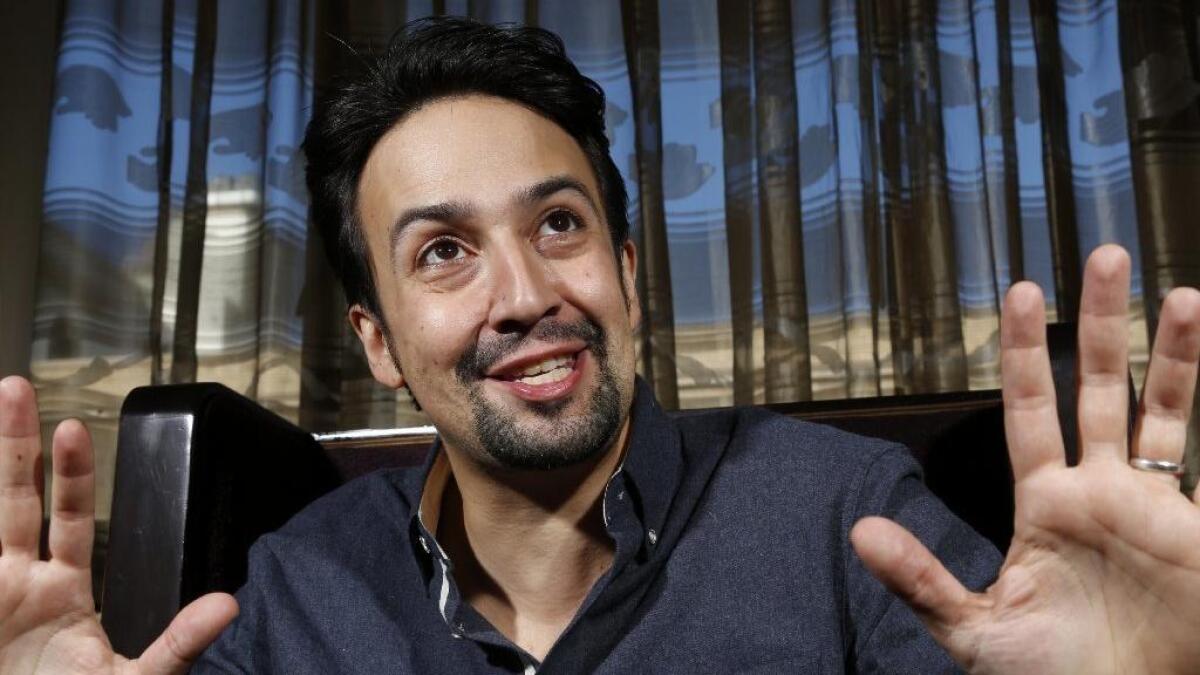
When black performers were excluded from all acting categories at the Academy Awards for a second year in a row in 2016, the shutout sparked a second year of an impassioned social media movement: #OscarsSoWhite.
You could say the campaign was a success. A week later, the Academy of Motion Picture Arts and Sciences pledged to phase out senior members and enlist new, diverse voters who would, if all recruiting goals were met, double minority membership by 2020. This morning, for the first time, three black actors were nominated in the same category, of best supporting actress: Viola Davis for “Fences,” Naomie Harris for “Moonlight” and Octavia Spencer for “Hidden Figures.” Denzel Washington also was nominated in the lead acting category for his performance in “Fences,” and Mahershala Ali in the supporting actor category for “Moonlight.”
But Hollywood’s diversity problem isn’t solved. By many measures, it’s still as bad as ever. And the studios’ biggest minority deficit by far involves the very people living and working outside their walls in virtually every direction — Latinos.
There were no egregious snubs for Latinos — as expected, Lin-Manuel Miranda got a nod for original song for “Moana” — but that’s only because there were so very few roles for us to begin with. Though the Mexican auteur Alejandro González Iñárritu won the Oscar for best director in 2015 and 2016, and his countryman Alfonso Cuarón took home the same award in 2014, the two directors are elite aberrations.
- Share via
#OscarsSoWhite’s April Reign: Films are more black this year, ‘not more diverse’
Following last year’s industry-shaking #OscarsSoWhite campaign, the 2017 slate of Oscar nominations is surely more diverse with the likes of Octavia Spencer, Denzel Washington and Barry Jenkins all taking home nominations. But according to April Reign, former attorney, managing editor of BroadwayBlack.com and the hashtag’s creator, the fight for actual diversity and inclusion is not yet over.
“One year does not make up for over 80 years of underrepresentation of all genders, sexual orientations, races, abilities and First Nation status,” she said to The Times. “#OscarsSoWhite is about the inclusion of all marginalized communities, both in front of and behind the camera, throughout the entertainment industry.”
Films heralded for their diversity this year included “Fences,” “Lion,” Hidden Figures” and “Moonlight.” Notable other standouts include the nomination of the first African American cinematographer, Bradford Young for “Arrival” and the first black female editor, Joi McMillon for “Moonlight.” And many of these films have been commercial successes, rebuffing a tired industry belief that diverse films cannot be profitable.
“This year’s slate of Oscar nominees highlights that, when given the opportunity, films that reflect the diversity of this country will shine,” Reign added.
Still, a number of communities find themselves not represented in Hollywood. Such representation “can only be achieved with enthusiastic support from studios beginning at the screenwriting process and continuing through film distribution,” Reign said.
How will we know there is an end to #OscarsSoWhite? (Especially since many want to cancel or pause the movement.)
“I think we know when inclusion is commonplace,” Reign said. “We know when the studios are all actively seeking the stories of the marginalized, and that’s not happening yet. Theatergoers will know when they have a myriad of choices, not just around award season, but all year long from which to choose.
“Everyone is saying the Oscars are more diverse this year. No they’re not. They’re blacker, but where are the Latinx movies, the LGBTQIA movies? The Asian American/Pacific Islander community has had a worse year. We can’t forget [them] just because we have black nominees this year. #OscarsSoWhite is about everybody.”
- Share via
With 14 Oscar nominations, Lionsgate’s ‘La La Land’ gamble is paying off
When executives at Lionsgate first entertained the idea of making a film about star-crossed lovers who sing and dance their way across Los Angeles, they had good reasons to hesitate.
The musical genre had been littered with flops including “Across the Universe,” “Rent” and “Rock of Ages.” Even more worrisome, “La La Land” was an original story with entirely new songs, making it an especially risky proposition.
READ OUR FULL COVERAGE OF ‘LA LA LAND’ >>
“We were really taking a leap of faith,” said Erik Feig, co-president of Lionsgate’s motion picture group. “There’s no way any focus group could’ve said, ‘I want to see something like “La La Land” before they saw “La La Land.”’”
- Share via
Are the Oscars still #SoWhite? A look at the diversity among this year’s nominees
In sharp contrast to the last two Oscar seasons, this year non-white nominees made the list in every major acting and directing category.
We’ve been tracking the nominees all along. How do this year’s nominees compare to 2015 and 2016 when the #OscarsSoWhite backlash started? Check it out.
- Share via
‘La La Land’ ties ‘All About Eve’ and ‘Titanic’ for most Oscar nominations
One is a tale of backstabbing betrayal and a blueprint for withering repartee.
Another documented the grandeur and sad fate of the most notorious shipwreck in history.
And the third is a musical love letter to Los Angeles, full of whimsical song and dance.
READ OUR FULL COVERAGE OF ‘LA LA LAND’ >>
The storylines couldn’t be more disparate, but “La La Land,” 1950’s “All About Eve” and 1997’s “Titanic” now share the distinction of being the most nominated films in Oscar history, with 14 apiece.
If history repeats itself, it might not be a clean sweep for “La La Land.” At the 1951 Academy Awards ceremony, “All About Eve” won six of its 14 nominations, including best picture, but snubbed Bette Davis for best actress (insert Bette Davis death glare here).
“Titanic,” however, steamrolled its competition, picking up 11 awards, including best picture and director (but, again, denying the best actress award to Kate Winslet).
So fasten your seatbelts, it’s going to be a bumpy night on Feb. 26. Or maybe not.
- Share via
Listen to the Oscar nominees for original song
Which original song nominee is most likely to get stuck in your head for the longest? “City of Stars” or “Moana’s” big ballad? Our money is on Timberlake’s “Can’t Stop the Feeling.”
“Audition (The Fools Who Dream)” (from “La La Land”)
“Can’t Stop the Feeling” (from “Trolls”)
“City of Stars” (from “La La Land”)
“The Empty Chair” (from “Jim: The James Foley Story”)
“How Far I’ll Go” (from “Moana”)
- Share via
None of the best picture nominees has grossed more than $100 million
All too often, the Oscars come around and you’ll overhear someone at coffee or in a restaurant or in a waiting room saying, “I’ve barely heard of any of these movies; does anyone actually see them?”
For only the second time in the last 10 years, none of the best picture nominees — at the time of nomination — has grossed more than $100 million domestically. And that first time was in 2015, and that’s only because “American Sniper” had just opened in wide release; it would go on to gross $346.7 million in North America.
Here’s how the nine films nominated for best picture for the 89th Academy Awards have fared at the box office thus far:
- “Arrival”: $95.7 million
- “Fences”: $48.7 million
- “Hacksaw Ridge”: $65.5 million
- “Hell or High Water”: $27.0 million
- “Hidden Figures”: $83.7 million
- “La La Land”: $89.7 million
- “Lion”: $16.3 million
- “Manchester By the Sea”: $38.9 million
- “Moonlight”: $15.8 million
“Hidden Figures” and “La La Land” will cross the $100-million mark in the next week or two, and “Arrival” will likely get a nice post-nomination bump.
But if the goal of the 2011 decision by the Academy of Motion Picture Arts and Sciences, when it changed the rules and allowed up to 10 films to be nominated for best picture, was to be able to include more films that reflect the popular taste, then that hasn’t quite panned out this year.
- Share via
Animated short film
“Blind Vaysha,” Theodore Ushev
“Borrowed Time,” Andrew Coats and Lou Hamou-Lhadj
“Pear Cider and Cigarettes,” Robert Valley and Cara Speller
“Pearl,” Patrick Osborne
“Piper,” Alan Barillaro and Marc Sondheimer
- Share via
Animated feature film
“Zootopia”
“Kubo and the Two Strings”
“Moana”
“My Life As a Zucchini”
“The Red Turtle”
- Share via
Directing
Damien Chazelle, “La La Land”
Barry Jenkins, “Moonlight”
Kenneth Lonergan, “Manchester by the Sea”
Denis Villeneuve, “Arrival”
Mel Gibson, “Hacksaw Ridge”
- Share via
Live action short film
“Ennemis intérieurs,” Selim Azzazi
“La femme et le TGV,” Timo von Gunten
“Silent Nights,” Aske Bang, Kim Magnusson
“Sing,” Kristof Deák, Anna Udvardy
“Timecode,” Juanjo Gimenez
- Share via
Actress in a leading role
Isabelle Huppert, “Elle”
Ruth Negga, “Loving”
Natalie Portman, “Jackie”
Emma Stone, “La La Land”
Meryl Streep, “Florence Foster Jenkins”
- Share via
Film editing
“La La Land”
“Moonlight”
“Hacksaw Ridge”
“Arrival”
“Hell or High Water”
- Share via
Actress in a supporting role
Viola Davis, “Fences”
Michelle Williams, “Manchester by the Sea”
Naomie Harris, “Moonlight”
Nicole Kidman, “Lion”
Octavia Spencer, “Hidden Figures”
- Share via
Original screenplay
“Hell or High Water,” Taylor Sheridan
“La La Land,” Damien Chazelle
“The Lobster,” Yorgos Lanthimos and Efthimis Filippou
“Manchester By the Sea,” Kenneth Lonergan
“20th Century Women,” Mike Mills
- Share via
Original score
Justin Hurwitz, “La La Land”
Mica Levi, “Jackie”
Nicholas Britell, “Moonlight”
Volker Bertelmann and Dustin O’Halloran, “Lion”
Thomas Newman, “Passengers”
- Share via
Production design
“Arrival” (Patrice Vermette, Paul Hotte)
“Fantastic Beasts and Where to Find Them” (Stuart Craig, Anna Pinnock)
“Hail, Caesar!” (Jess Gonchor, Nancy Haigh)
“La La Land” (David Wasco, Sandy Reynolds-Wasco)
“Passengers” (Guy Hendrix Dyas, Gene Serdena)
- Share via
Sound editing
“Hacksaw Ridge”
“Deepwater Horizon”
“Arrival”
“Sully”
“La La Land”
- Share via
Original song
“Can’t Stop the Feeling!” - “Trolls”
“How Far I’ll Go” - “Moana”
“City of Stars” - “La La Land”
“Audition (The Fools Who Dream)” - “La La Land”
“The Empty Chair” - “Jim: The James Foley Story”
- Share via
Cinematography
Linus Sandgren, “La La Land”
James Laxton, “Moonlight”
Bradford Young, “Arrival”
Rodrigo Prieto, “Silence”
Grieg Fraser, “Lion”
- Share via
Visual effects
“The Jungle Book”
“Doctor Strange”
“Rogue One: A Star Wars Story”
“Deepwater Horizon”
“Kubo and the Two Strings”
- Share via
Sound mixing
“La La Land”
“Hacksaw Ridge”
“Rogue One: A Star Wars Story”
“Arrival”
“13 Hours: The Secret Soldiers of Benghazi”
- Share via
Makeup and hairstyling
“A Man Called Ove” (Eva Von Bahr, Love Larson)
“Star Trek Beyond” (Joel Harlow, Richard Alonzo)
“Suicide Squad” (Alessandro Bertolazzi, Giorgio Gregorini, Christopher Nelson)
- Share via
Costume design
Mary Zophres, “La La Land”
Madeline Fontaine, “Jackie”
Consolata Boyle, “Florence Foster Jenkins”
Colleen Atwood, “Fantastic Beasts and Where to Find Them”
Joanna Johnston, “Allied”
- Share via
Actor in a leading role
Casey Affleck, “Manchester by the Sea”
Denzel Washington, “Fences”
Ryan Gosling, “La La Land”
Viggo Mortensen, “Captain Fantastic”
Andrew Garfield, “Hacksaw Ridge”
- Share via
Documentary feature
“Fire At Sea”
“I Am Not Your Negro”
“Life, Animated”
“O.J.: Made in America”
“13th”
- Share via
Documentary short subject
“Extremis”
“4.1 Miles”
“Joe’s Violin”
“Watani: My Homeland”
“The White Helmets”
- Share via
Foreign language film
“Toni Erdmann,” Germany
“The Salesman,” Iran
“A Man Called Ove,” Sweden
“Tanna,” Australia
“Land of Mine,” Denmark
- Share via
Actor in a supporting role
Mahershala Ali, “Moonlight”
Jeff Bridges, “Hell or High Water”
Lucas Hedges, “Manchester By The Sea”
Dev Patel, “Lion”
Michael Shannon, “Nocturnal Animals”
- Share via
A look at the first Academy Awards at the Hollywood Roosevelt’s Blossom Room in 1929
Before a large gathering of motion-picture celebrities and other notables, the first Academy Awards ceremony is held at the Hollywood Roosevelt Hotel. Academy President Douglas Fairbanks handed out 15 statuettes for outstanding achievement in 1927 and 1928.
Best picture: “Wings”
Actor: Emil Jannings, “The Last Command” and “The Way of all Flesh”
Actress: Janet Gaynor, “Seventh Heaven,” “Street Angel” and “Sunrise”
Director: Frank Borzage, “Seventh Heaven”
- Share via
Missed the Oscar nominations? Re-watch the whole announcement here
The announcements have come and gone, but if you missed the actions you can re-watch the announcements right here. What did you think of the new Oscar delivery system? There were plenty of fancy interviews with famous celebs but no live action accidents. Did the new nomination video still feel special?
The 89th Academy Awards will take place on Feb. 26 at the Dolby Theatre in Los Angeles and will air live at 5:30 p.m. PT.
- Share via
Despite backlash, ‘La La Land’ might make Oscar nominations history
If you were one of the relatively few people bewitched, bothered and bewildered when Damien Chazelle’s musical “La La Land” won a record seven Golden Globes a couple of weeks ago, you should probably avoid the news Tuesday morning when Oscar nominations are announced.
“La La Land” could well make history. Pulling down 14 nominations is a real possibility, which would tie it with “All About Eve” and “Titanic” as the Academy Awards’ most nominated movies.
READ OUR FULL COVERAGE OF ‘LA LA LAND’ >>
That heady distinction will probably add a bit of fuel to the small, online backlash that has sparked since “La La Land” began winning (and breaking) hearts at fall film festivals. The complaints lodged against the movie are numerous, but generally revolve around three things: 1) We don’t need a white guy (especially Ryan Gosling) to explain and/or save jazz; 2) The singing is thin, and the songs aren’t exactly Gershwin, are they? 3) Some people are just irredeemable grumps.
But, hey, this happens to every Oscar front-runner, deserved (I’m looking at you, “Argo”) or not. Just know that if “La La Land” picks up those 14 nominations, not everyone will be dancing. To borrow one of the film’s song titles: There’s always someone in the crowd.
- Share via
A film critic’s Oscar nominations wish list
Critics don’t get to vote on the Oscars, as the pundits and prognosticators are often fond of reminding us. But if we were given ballots, it’s safe to say that our individual choices would look markedly different from those of the Academy of Motion Picture Arts and Sciences at large.
Part of the critic’s job, after all, is to look beyond the choices put forth by the major studios and specialty divisions (noteworthy though many of them are) and sift through a full year’s worth of releases — big or small, locally grown or festival-imported — in search of the very best. And the very best can’t always afford a for-your-consideration ad.
Below is my partial hypothetical ballot, my list of what I would like to see nominated in 12 categories (picture, director, the four acting races, the two screenplay races, cinematography, foreign-language film, documentary feature and animated feature). Some of them will be nominated; most of them don’t have a chance in hell. All of them are well worth a movie lover’s time.

